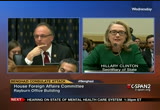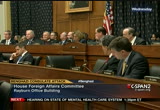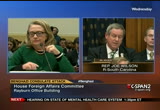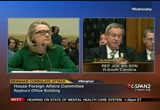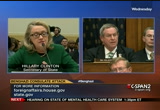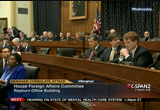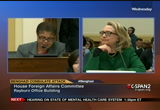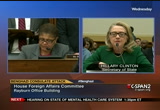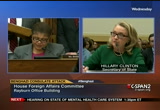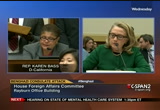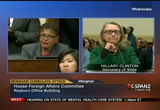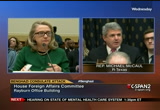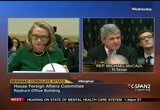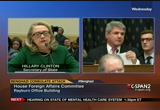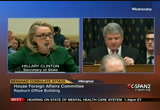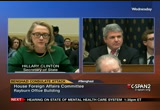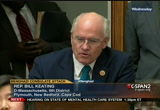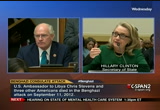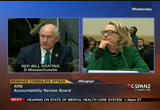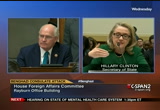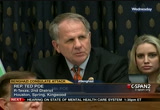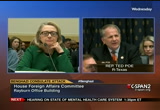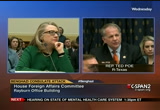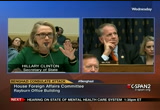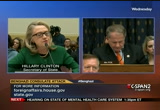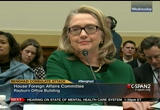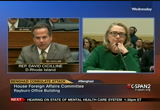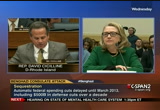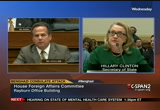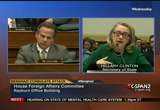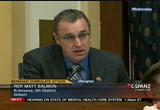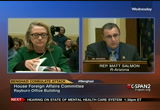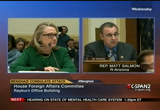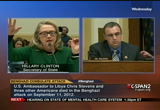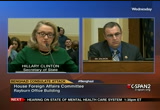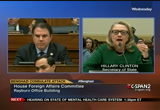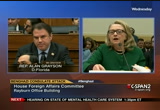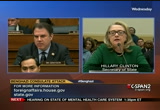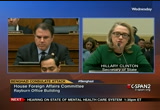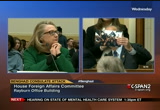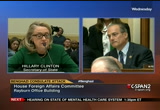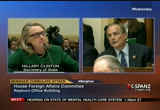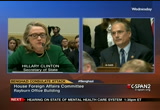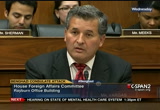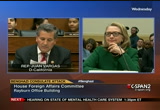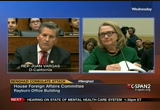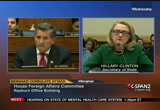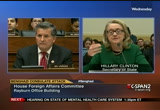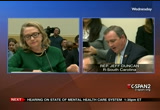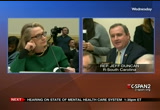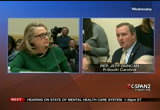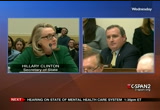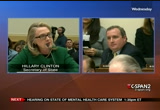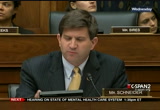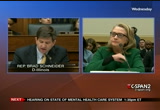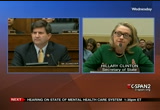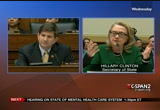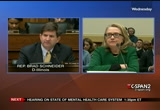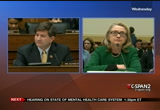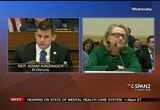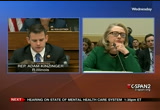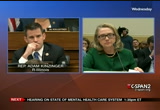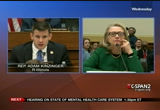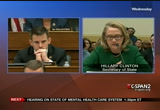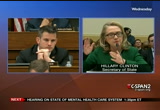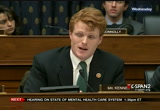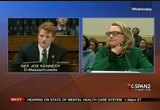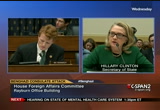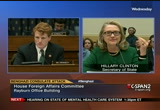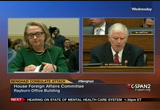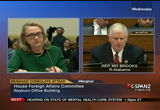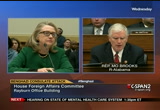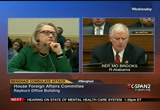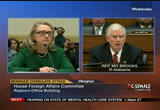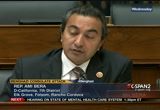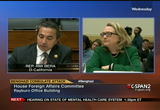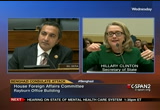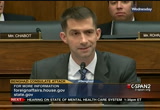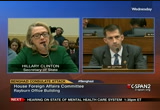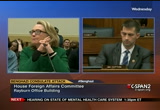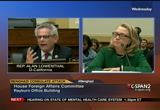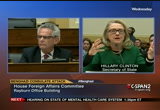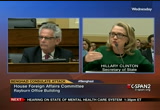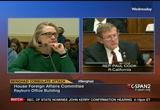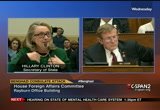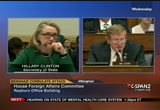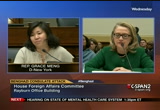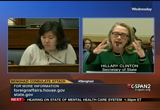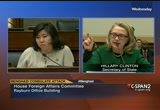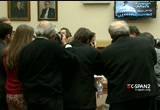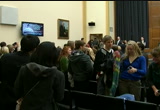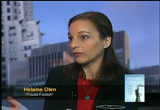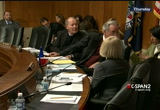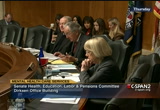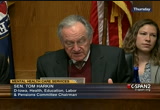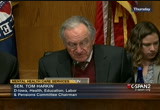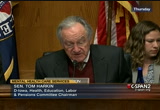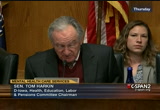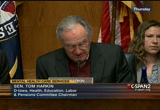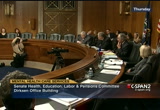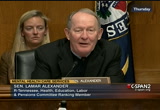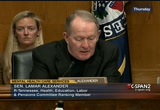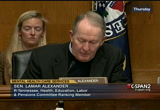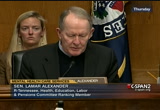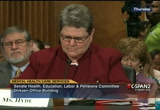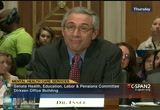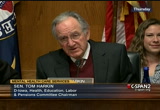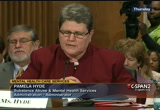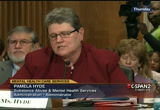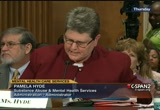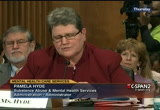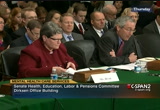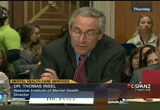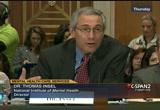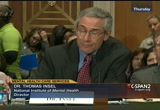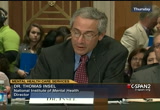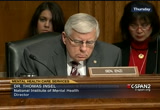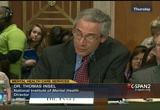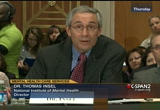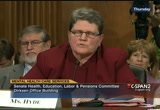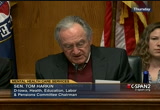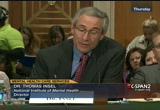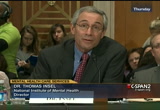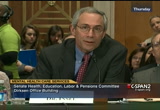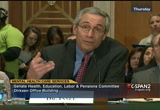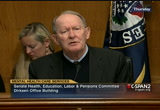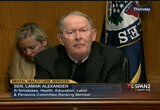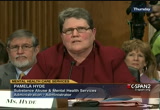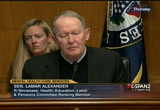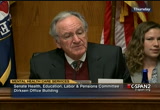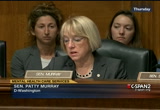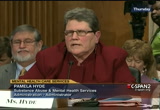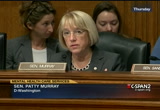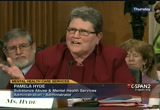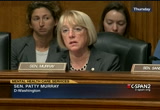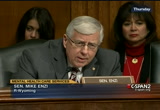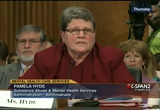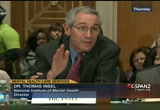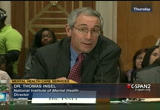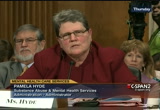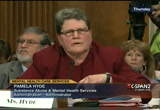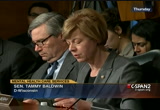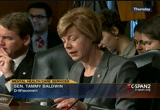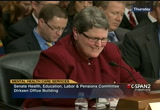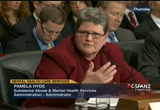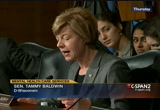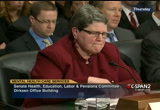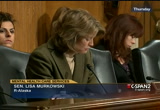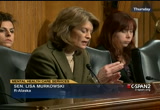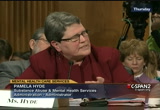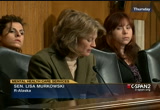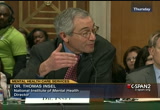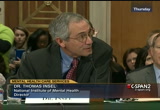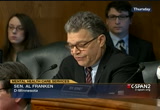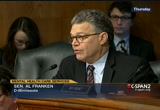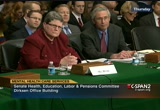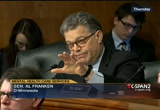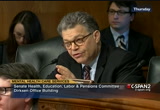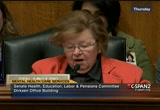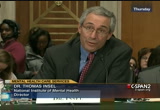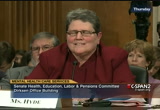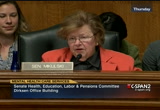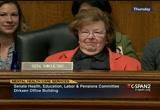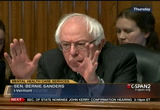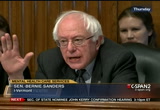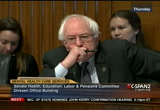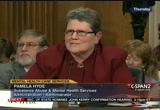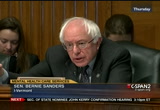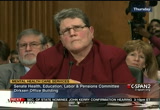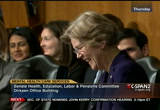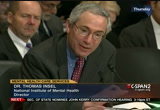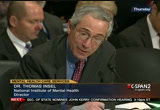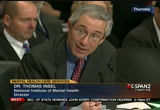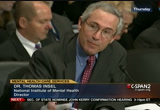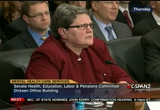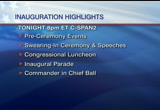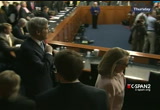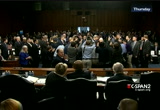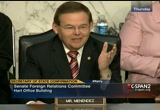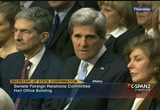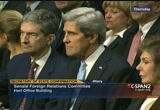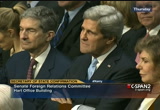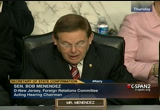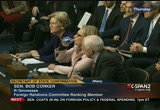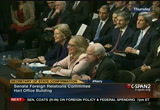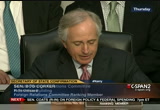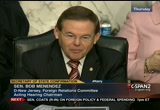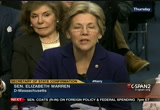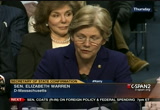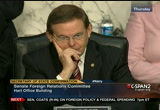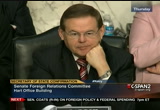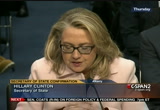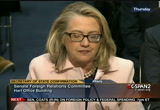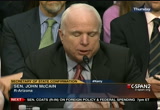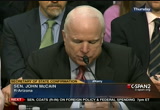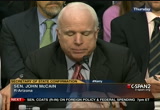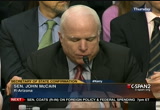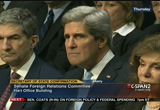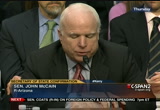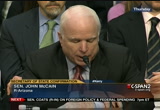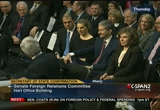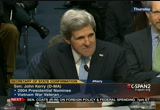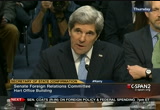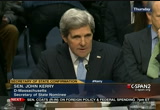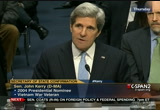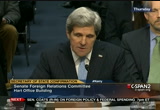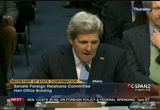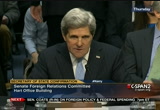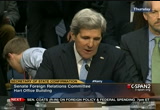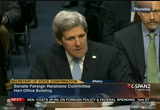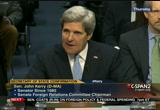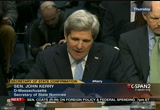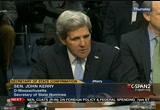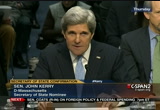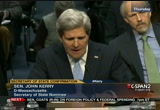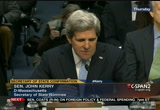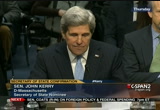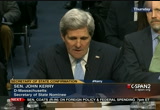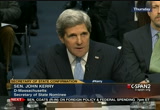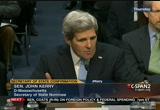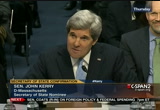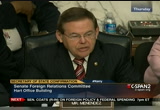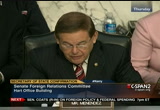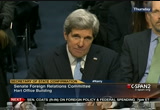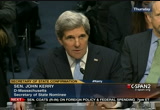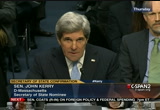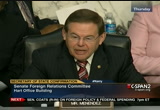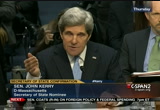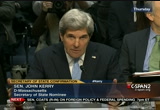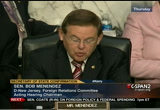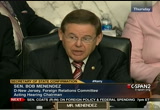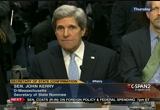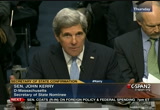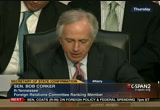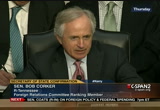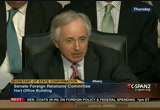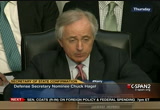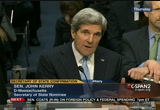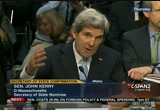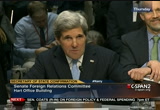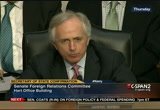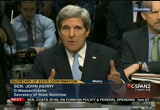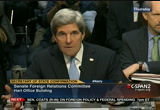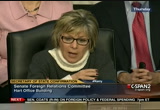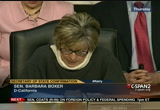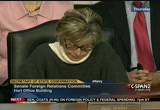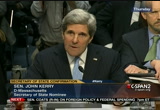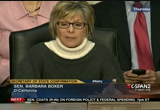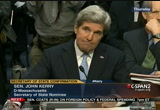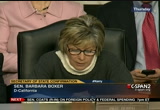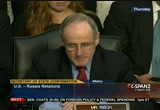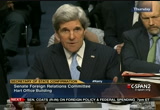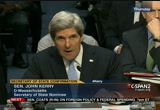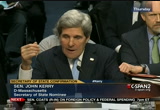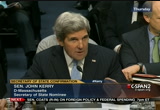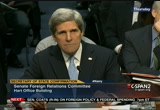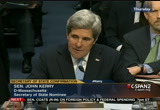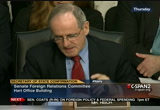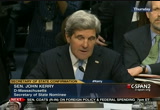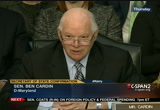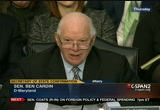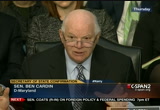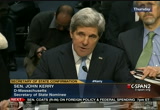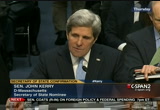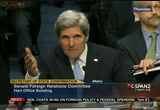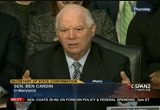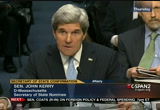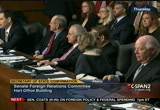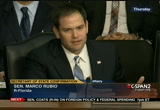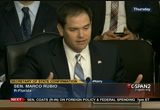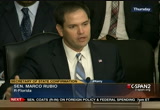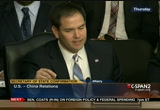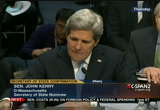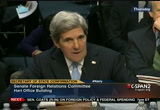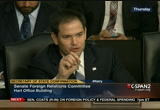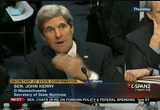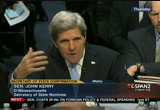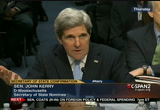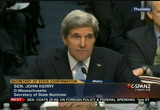tv U.S. Senate CSPAN January 25, 2013 12:00pm-5:00pm EST
12:00 pm
12:01 pm
i do want to point out for the record that martin walker is correct. for the diplomatic security following the benghazi attacked specific quote all the diplomatic security has been fiscally prudent to do not feel they've ever been at a point where we sacrifice security due to a lack of funding. that actually is an attribute to you and i have faith in the chief financial officer that it's a statement as we begin it's been reported that since you've managed to the response to the benghazi attack why weren't you the person to appear on the sunday show immediately following the attack? ambassador susan rice said that you declined; is that correct? >> well i have to confess you're in public that going on the sunday show is not my favorite
12:02 pm
thing to do. there are other things i prefer to do on sunday mornings. i haven't been on a sunday show in way over year so it isn't just something that i normally jump to do. i did feel strongly that we had a lot we had to manage that i had to respond to and i thought that should be my priority. >> i believe part of the priority is telling correct information coming and you could have done that. i think it's very unfortunate that multiple appearances by ambassador rice with information has been discovered not to be correct. in the november 21st, 2012 edition of the three-year a william was -- paper was published by william herbert. he wrote there's an office known as op center located in the office of the secretary of
12:03 pm
state. it is staffed part of the clock 24/7 by senior foreign service officers. it's to be sensitive to any threat to american interests, wherever they might arise. the center's director, security and an occasion lines to the white house situation room, the national military command center the pentagon and cia op center. having worked as a watch center in the information that has a threat to the safety of citizens overseas is passed through other agencies mentioned above. if it is of significant message concerning american interest is received, it is the watch officers, to ensure that these other agencies are informed. he goes on there are many other questions that need to be answered and i would present these questions on his behalf. first and foremost was going on at the office of the department in washington while our consulate was under attack for
12:04 pm
seven hours? >> well, we can certainly give you greater detail, but the center as you have described, you know it is the place communications goes in and out. they were receiving calls, they were deeply engaged in trying to help us. they don't reach out on their own but to help us acquire information so that we can respond in real time. >> in seven hours, goodness gracious there should have the response. why did labeling the attack as terrorism immediately known that it was? >> again, i would say that we described the attack. i described the attack the next morning. the president called it an act of terror. there was a as you will find reading the classified and unclassified version there was questions who was behind it, what motivated it, and the questions are still not fully answered today.
12:05 pm
if he continues why weren't they posted in benghazi in the first place? >> because historical ev marine guards were at a post where there is classified information. marine guards have not historically had the responsibility for protecting personnel. their job is to protect and if necessary destroyed classified material. at our compound there was no classified material. >> continues in line with everybody else pointing out there were requests to enhance security that were denied. were they able to reach all the questions? i respond you responding to the questions and i will submit them for the record for your office for written response. >> thank you. >> care in boss of california. >> thank you very much. thank you chairman royce for convening this hearing. secretary clinton, i want to take the time to thank you for your willingness to come before this committee for the final time. and i want to offer my sincere
12:06 pm
and deep gratitude for your remarkable service to our nation. i am very glad to know that you are feeling better. the past four years and well before you put the country first, and for that the nation is indented to you. with careful consideration you have shown an extraordinary leadership on countless issues ensuring diplomacy is an important part of the country's foreign policy and your tireless efforts to elevate women and girls rights is without comparison. you have strengthened the state department and needed better today than when you arrived. as a ranking member of the subcommittee i am especially appreciative of the attention that you've given to the 54 nations of africa. while africa may lose one of its most steadfast and dedicated champions at the state department, i trust that that cut will not be far from your thoughts and that it will remain a top priority in your future work. i also want to associate my comments with congressman sherman who said it's unfortunate that this is the
12:07 pm
last time we will hear from you. so i want to focus my time on moving us forward and asking advice. you made reference in your testimony about best value contract, and you mentioned i believe several nations were best value contracts are not used, and in thinking about africa in the instability in the number of nations in northern africa central africa moly i want to know what we are dealing with now and whether those nations are subject to the stick of contracts and whether or not exceptions or readers should be made. what should we do? >> congresswoman, thank you very much for your emphasis on africa, which i think is going to be increasingly important. there are only three nations where the state department has an exemption by congress for using different contract in rules in order to get the best value for our country. iraq, afghanistan and pakistan so every country in the world we
12:08 pm
are under the kind of contracting world that i think do interfere with our capacity to get the best deal, particularly when it comes to security that we should in these countries where the threats unfortunately are going to always be with us. >> should we look to extend that to the drc come to somalia? >> there was an article i think in one of the newspapers today that went into some detail. basically years has started. federal law required the state department to select the cheapest rather than the best contractor to provide local card services at its embassies abroad and there's that old saying you get what you pay for and this lowest price provision started off in 1990, but it has just stayed with us and i would respectfully request that this
12:09 pm
committee would take a hard look at it. you can't do a total lifting of it for everybody at least look at the highest post where obviously we did it for iraq and afghanistan and pakistan and the countries that you are naming our countries that i think would fall into that category. >> thank you very much bigger to operating in africa today, aqim, al-shabaab to name a few come in your view, which pose the greatest threats to the united states command given the limited capacity in some cases the limited political will of the countries in which these groups operate. the u.s. military intelligence and security assistance resources devoted to these threats adequately are appropriately balanced and what recommendations would you have for us? >> if you are focusing just on north africa, al qaeda is a brand name as much as an
12:10 pm
organization. people wake up, they form these jihadists groups. they then plan to be associated with somehow, affiliated with al qaeda to gain credibility with local people as well as beyond. i think that we have to take seriously all of these terrorist groups, whatever they call themselves. now, at the moment they don't necessarily have either the interest or the devotee to attack our homeland. but we have a lot of facilities. we have a lot of assets in north africa. we just saw americans killed and held hostage at a gas as a buddy because we do business all over that continent so we have to take a hard look at all of them and constantly be helping our military intelligence and diplomatic assets to deal with them. >> we pass the language that you are speaking in the house passed
12:11 pm
appropriations measure. we are going to try to get our colleagues in the senate to take it measure up. we go now to mr. mccaul from texas. >> thank you mr. chairman and madame secretary for your service. a similar to september 11, 2001, there were warning signs prior to the september 11th. there was an april 6th 2012 thrown over the wall of the u.s. facility in benghazi. on may 22nd, 2012, the red cross building in benghazi were hit by brigade of the imprisoned took responsibility for that attack on june 6, 22 of the u.s. consulate in benghazi was targeted by an ied that blew a hole in a wall. again, the brigade taking credits.
12:12 pm
the classified state department cable warning that the benghazi council couldn't withstand a coordinated attack in the regional security officer believed the consulate couldn't be protected in that emergency meeting less than one month before the attack on 9/11. the plan was supposedly drafted to move the operations to this the guy amex about a mile away from the compound. this cable was presented to have been shared by senior staff sent to your office consent to the nfc and even on september 11th ambassador stevens was killed, he personally to become personally warned growing frustration with security forces in the libyan police. were you aware? >> that didn't come to my attention. i have made it very clear that the security cables did not come
12:13 pm
to my attention or above the assistant secretary level where the arb place responsibility where and dahuk sadr pickering said the rubber hits the road. >> where were you at this table. >> after it began to gather information and material, which of course -- >> who was in your office and did see this case? >> i'm not aware of anyone within my office in the secretary's office, just having seen the table. >> in the national security council? >> i have no awareness of anyone in the security council having seen that cable. >> was this a surprise to you? >> congressman, it was very disappointing to me that the arb
12:14 pm
concluded that there were inadequacies and problems in the responsiveness of the team here in washington to the security requests that were made by the team and libya and i was not aware of that going on. it wasn't brought to my attention that it's something that we are fixing and intend to put into place protocols and systems to make sure that it doesn't happen again. >> i certainly hope so. when you have the united states ambassador warning and at the situation sending this cable to your office. >> 1.4 come to this department all addressed to me. >> probably somebody was in your office and should have seen this cable in my judgment. >> can i ask one last question?
12:15 pm
>> i just want to clarify as with regard to the security request come subsequent to the august 16th cable, they haven't submitted any additional security requests to washington at the time of the september 11th attack. now, there was an ongoing dialogue as you know between libya and washington. i think it is -- >> reclaiming my time. an emergency meeting was held in the cable sent out on august 16th by the ambassador himself morning what could happen, and amend this cable went unnoticed by your office. that is the bottom line. >> i would be happy to have people give you this in detail state to the security request for benghazi would be forthcoming. it was submitted in tripoli to propose the security
12:16 pm
recommendations on august 23rd, but no requests were submitted to washington before the attacks. this sounds very complicated and to some extent it is. we are trying to simplify it and avoid the kind of problems -- >> one must question, why was he in benghazi on the night of september 11th? i will submit that question in writing. estimate would be fine. we are going to go to mr. william of massachusetts. >> thank you, mr. chairman. i must say that after the tragedy of last september, one of the things that moved me so much for the comments of the family members of one of the hero's who lost their lives. glendora the in massachusetts. i am paraphrasing them, but they told people that we shouldn't lose sight over who is ultimately responsible for these deaths. an amazing statement putting things into perspective here. and the ever been mentioned is to not lose sight of the causes
12:17 pm
that these men gave their lives for. and as a person who was advanced of those causes, i want to thank you for your incredible service as the secretary of state. now, one of the parts of the arb report is of great concern to me dealt with what they described as the culture of austerity in the state department. madam secretary, can you take a few moments and expand on the arb finding of the subject and what effects the ability to carry out a crucial task, not just security but all crucial paths? >> congressman, that is what the arb found, there was a culture of the husbanding resources being quite concerned about responding even on security, as important as security is because one never knows what the budget is going to be going forward.
12:18 pm
we have had some ups and downs going back as i said in to the prior administrations but it is fair to say that many of the professionals in the state department have gotten used to worrying greatly they will give something to somebody and that will become an expectation of to be taken away and it did affect the security professionals decisions according to the arb. >> these priorities in the culture interchange not just for security reasons but our overall mission. just quickly with the crisis and mollyann to the insurgency there and the spreading chehab france and northern africa and moderate and the arabian peninsula in that area there will look tivoli technologically advanced that go along those lines i'm concerned about in terms of the cultural
12:19 pm
austerity there as well, cyber threats and other security of trades for going to be vitally necessary. i hope those kind of things are not lost as we review the situation. can you comment on what we need in that regard going forward, and how much of a threat this may pose to us? >> welcome you mentioned a word that is rarely mentioned in these hearings but i predict that it will be a major threat to us, and that is cyber because it is not only going to be the nation states where we already are seeing cyber intrusions' both against our government and against private sector, but increasingly common on state actors will have more capacity to disrupt and to hack into put out false information to accuse the united states of things that can light five years before we can put them out. so, you know, i think it's important we have a really
12:20 pm
thoughtful comprehensive review about the threats of today and tomorrow and that will help guide the committee and the senate and the administration working together to answer them. >> thank you madam chair and onto something that hasn't been done. i'm going to yield back the rest of my time. >> we will not go to mr. perot of texas pittard >> thank you mr. chairman and madame secretary for your service to the country. gordon roland from oregon, frederick from texas and victor am i district of texas, three americans overseas killed not in benghazi, that killed at a remote gas facility in algeria. killed in my opinion because they were americans. over the last weekend, myself
12:21 pm
and others have tried to get information. i would say there's too much in my opinion red tape from trying to get basic information from the families as to what happened in a situation like that. i would hope the state department but what the protocol and try to streamline and because people die. the algerian government reports after the of captured some of the terrorists alive, some claiming to be from egypt, one says after interrogation by the algerian government, whatever that interrogation may entail that there were a egyptians involved in the benghazi attack but were up the attack on the
12:22 pm
gas plant in algeria. at the time of the attack and in all sharia the next day the terrorist groups as you know claimed responsibility for the attack. we probably don't know if the statements made by the algerian war excuse me, the egyptian terrorists that were captured or truly egyptians were followed or involved in those attacks or not. it does seem to show that the whole region is very fluid with different groups getting together causing mischief throughout that entire region to read as of today, several months later after the attack in benghazi house to your knowledge any person been put in custody anywhere by any government for
12:23 pm
the response of the that you are as a suspect involved in the benghazi attack? >> congressman, there is one potential suspect has been placed under monitoring by the government. there are other suspects that the fbi or both closely following and consulting with partner governments. i think based on my last conversation with the director that was just a few days ago he went to libya and tunisia and believes the investigation is proceeding. they are doing was a fight briefings with certain committees. i don't know about this committee, but i certainly hope
12:24 pm
that the fbi is able to investigate and identify and hold responsible lowest wage this attack against us and i think that based on their work they feel that they are pursuing some very positive leads. >> my understanding is the person that was held was released by a judge. that person has been released. so you don't know at this point who did it. >> i confirmed with the director who was in the meeting with their high officials that this person is basically under law enforcement surveillance forbidden to leave. the director told me that had been confirmed by him. >> just very briefly, no one has
12:25 pm
been held accountable or charged with this offense. before gadhafi was taken out, my understanding is the nation had 18 shipments, 20,000 tons of weapons, machine guns into the region to help different groups overthrow the united states gives a wink and nod and i would like an answer to that, mr. chairman. >> we will now go to mr. selene. estimate the deep respect and admiration to people all over the world has enhanced america's standing all over the globe. your leadership on the women's issues, the ltte quality, this
12:26 pm
emerging democracies and enhancing the national security are numerous to list but i want to begin by thanking you for your hard work and everything that you've done in the country. the terrorist attacks and said to embrey 11th results in the tragic deaths of ambassador stephen space sean smith and these are constant reminders of the work that our diplomats engage in every single day all throughout the world. while we cannot eliminate all risks it's our duty to enact the particles that will reduce these risks and to provide all of the resources and support necessary to help mitigate and manage the risks. with a that in mind i hope my colleagues will consider the review board which you, madam secretary, convened coming into calls for and i quote a more serious and sustained commitment from congress to support state department needs. this is particularly important
12:27 pm
given the implications that the sequestered of the government shutdown would have on our diplomatic security especially in the high risk posts. i also want to take a moment to commend and thank the ambassador for the comprehensive and palm trees you they conducted and applaud you, madam secretary, for the adoption of all 29 recommendations for undertaking their implementations and providing guidance on the status of that implementation here today. and just to say there's been some discussion about the importance of getting to the nitty gritty and fixing problems i hope that we will rely on the security professionals and expert advice and recommendations will bring the best response to what needs to be undertaken. so i want to ask you one of the things you did in anticipation is created for the first time the deputy assistant secretary
12:28 pm
and with respect to the report to the importance of examining the state department's organization and management as it relates to security planning my expectation is that there would be one of the responses of the new position and i wonder if you could tell us about the role of the new secretary within the bureau, what response is the position will have and will this individual in particular have the authority to reallocate resources in order to fill the potential resource gaps if that is one of the challenges they face. estimate this a deputy assistant secretary for the high fructose i want one person held accountable looking at these high fructose talking to our intelligence partners being a voice of the table not just for all 275 posts and start zeroing in on the real time constant evaluation about what our hi threat posts mean.
12:29 pm
in addition to that, we are going to continue to work with the defense department and the interagency security assessment threats and also for the first time elevating a lot of these security issues for high threat posts to the secretarial level because it hasn't been there before and i think given what we have experienced it needs to be that we are also looking for the transfer authority to add to our marine security guards and construction and our diplomatic security we are enhancing the training for everyone and taking a look at a hard problem that the arb pointed out and that was the temporary duty assignments. very often given especially the experiences that we have had in iraq and afghanistan to a lesser extent and others we have a lot of our most experienced diplomatic security people going
12:30 pm
there. in the two times we have had a serious assault on our embassy in kabul is fortified, kabul has the troops across the street as they draw down we have to recognize the danger isn't going to leave with our military as we have to take a look at all of this and we have to in bed that responsibility in this new experience deputy assistant secretary to do that. >> alladi yield back, mr. chairman. >> from arizona? >> madam secretary, i appreciate your decision to answer questions to help make the changes necessary to ensure the safety of all of our foreign officers particularly those making the heavy sacrifices surfacing on non-- regions but i am troubled by what seems to be this administration's pattern to
12:31 pm
hold decisionmakers accountable from operation fast and furious where the attorney general eric holder has misled the american people and the congress about an intentional international gun walking scheme. susan rice on five separate occasions went before the american people after benghazi talking about a demonstration that if somebody that's never happened. it wasn't even suggested and the reports and information coming from benghazi. i know the pros of the hearing is find out how to ensure a matter benghazi never happens again it include the aftermath of the tragedy as well how we make sure that such presentations of a tax that would happen again a couple other questions i know you put the individuals defined as culpable by the board on the last administrative leave what do you anticipate will be the final resolution of the status in the department and the
12:32 pm
accountability review board didn't identify any individuals above the secretary assistant secretary level as accountable for the failures of the benghazi mission? use of the numerous tables requesting and begging for additional security resources sent by the ambassador were never sent by the state officials above the assistant secretary or assistant secretary charlene. i know that you care about the people that work with you and the department so given the fact your testimony is in these multiple requests and no levels of these requests doesn't that give you some concerns about the flow of information in the department and maybe some of your other links of ability to prioritize and get your attention serious issues you
12:33 pm
said that you get hundreds of thousands of the time and these cables directly i understanding you don't read them all or have the time to do that treaty would have people to work with you that are able to prioritize and get to you the ones that are serious in nature and especially when somebody's security is on the line. president truman had a doctorate on his desk that said the box tops here to refine know you've taken responsibility and i applaud you for that but i hope this isn't just another exercise in finding a lower-level bureaucrats you kind of throw under the bus and get somewhere with this. how can we fix this for the future, and i would yield back the balance and i would love ury answers. >> that is what i am intent on doing and biking fees' arb, not on, have made the findings.
12:34 pm
they were created to to give you a and recommendations on what are the responsibility of the department to implement. the arb makes it very clear that chris stevens knew more about libya than anybody else in the government. didn't see a direct threat of an attack on this nature or scale despite the trend of security problems that we faced kid i have to add neither did the intelligence community. the arb makes it very clear that the intelligence community also did not really a zero in on the connection between the deteriorating threat environment in eastern libya and in benghazi and in a direct threat on our
12:35 pm
compound. we have work to do inside of the department and with our partners and of the dod and the intelligence community to constantly be taking that information and make sure it does get to the right people and it isn't somehow stovepipe or stalled but that it does rise to decision makers and i am committed to improving every way that i can with the arb told us to do on assessing our intelligence and i think it's fair to say, congressman, that we have to do this now because i predict that we are going to be as we saw in algeria seeing all kinds of asymmetric threats not just to the government is devotees that private sector facilities in to nisha although we protected our embassy and our school was badly damaged so we have to take a broad view and i think it is a start but it's not the whole story.
12:36 pm
>> mr. grayson from florida. 63 mr. chairman and secretary clinton for your contributions to securing america's place in the world for the past four years and for your contributions towards world peace. the first question i have to ask has to do with the account of the review board that does identify specifically people who were found to have engaged in the department and systematic failures and deficiencies. i want to be clear about this, you were not on of those people; is that correct? >> that is correct. >> it was identified earlier that a free port dating back from the 1990's has had said that the secretary should take a personal and active role in security. have you done that in your four years of the state department? >> i have been very attuned to the environment in which threats are occurring, the intelligence that is available.
12:37 pm
certainly not the specific requests and decision making that rests with a security professionals. >> regarding security professionals is their anybody in the security department that is responsible for reviewing the itinerary of the ambassadors in advance to determine whether there is an undue threat to their safety? >> the general answer to that is no. ambassadors are given what is called a chief of mission of already. ambassadors, especially those that we ask to go to dangerous posts are pretty independent folks. some of them might say what do you think about this or that most of them make their own decisions. i don't think that it would have crossed his mind. robert who served as our ambassador to syria went out on numerous occasions to talk to the opposition before we pulled them out of damascus.
12:38 pm
we had coming you know, very brave ambassadors, like ryan crocker, one of our very best who it would be very difficult to say you can't do this even though you decided you should do it. but what we are trying to do is create a more ongoing discussion between our ambassadors, our bureau back in the state department at our regional experts and our security people so that at the very least, no one ambassador is taking an unnecessary risk however that is the kind. >> with regards to the ambassador stevens, certainly it was brave of him to go to benghazi on the days he did. i have to ask you honestly though, was their anything on the itinerary on the 11th that actually specifically required his personal presence? >> he certainly thought so, congressman, and he did of course discuss this with his own security people but we do have regional security officers in
12:39 pm
these posts. they are the ones and ambassador will return to. he believes it was important for him to go to benghazi. there were a number of meetings that he was holding in some public events that he had on his schedule, and he was someone who believed strong the he had to get out there, and i think as the arb has pointed out, he was given great difference by the rest of the government. >> do you have any concept of the number of american troops that might have taken to actually create a totally secure environment for him and benghazi on september 10th and 11th? >> no the number of diplomatic security personnel requested in the cable was five. there were five there that night with him, plus there was a
12:40 pm
mutual understanding with the amex that had a much more heavily armed presence because of the work that they were doing in the region. it is very difficult in retrospect to really anticipate what might have been one of the our besso's that served in libya said the kind of attack the compound suffered hadn't been anticipated. we had gotten used to preparing for car bombs and suicide bombers and things like that, but this was of a different nature, and we saw at the genex which was much more heavily fortified and have much more heavy military equipment we lost two of our best and we had one of our diplomatic security officers badly injured. he's still at walter reed. so, even the mx, which had more assets in the face of the attack was suffering losses that might.
12:41 pm
>> thank you very much. >> good afternoon, madam secretary. in august 20 talf prior to the benghazi attack, the letter in congress published a report on behalf of a division dod called the al qaeda in libya profile. this report outlined the growing presence particularly in east libya where benghazi is located. something was especially alarming to me in this report was the mengin that al qaeda groups in libya had adopted the black flag that symbolizes the commitment promoted by al qaeda senior leaders. in my hand i hold a picture of the flag that the department of state identified to be a prominent issue ends of this
12:42 pm
flag and on the rise in libya. i also hold a picture of the same flag, same type of flag and to nisha where the protesters were outside. in addition i have a flag -- picture that was taken in cairo at the u.s. embassy where the demonstrations took place. another picture in jordan at the u.s. embassy where protests took place. in mokrzan over 200 protesters had u.s. israeli flags again at the embassy. in libya in the u.s. compound the flag was flown and carried through the streets as well. my question, madam secretary, were you aware of this report
12:43 pm
prior to the terrorist attack in benghazi? >> i was aware of a number of reports from throughout our government. i don't know the specific one that you were referring to. there were intelligence community reports, talking about the decrease income or the increasing threat environment in eastern libya that is what we were trying to address with the libyans. remember that the election in july brought to victory what we would consider modernist -- moderate. people who had a different view of the future than certainly al qaeda or any of these had. there's going to be a struggle in the region, and the united states has to be as effective in partnering with the non-jihadists with a flyable lack flag or any other.
12:44 pm
>> i clearly understand that, however this flag was pointed out to be affiliated with al qaeda terrorists who attack and kill united states citizens and others around the world. did anyone in your department below you weren't you aware of this report and photos prior to a and don't you think they should have brought this to your attention? >> what i'm trying to say is i am well aware there were people claiming to be associated with al qaeda that were attempting to influence militia, attempting to exercise more authority along with a number of other groups that didn't necessarily work under that flag that had the same militant chehab mentality. so yes, i was certainly aware of that. where were chris stevens come so was the team in libya. estimate but my point is that
12:45 pm
this flag kept coming and you didn't think that was important enough to increase security when after how many embassies were shown in demonstrations? i personally think that it would demand an increase in security, and those below you that might have known this. i come from the industry come from the government, and there are individuals that have to be cut loose to read these people on leave are they still being paid? >> they are on administrative leave and regulation still being paid. estimate what is the holdup? this should have been brought to my attention. i no longer need your services. >> i would be happy to give you an answer because personnel discussions are not appropriate for public settings but we have taken every step that was available and we will continue
12:46 pm
to do so and we are looking for additional authorities. to finish up on the point that you made, we have good security at all of those embassies other than in with tunisa and i go back to the point was made on the other side of the all we are dependent on the host governments support where it doesn't exist unless we invade and unless we have a big military presence in the country we are doing the best we can recover diplomatic security and private security guards and any other help we can get. >> thank you very much, mr. chairman for the opportunity. and thank you very much, madame secretary for being here. i also want to thank you for the excellent work and you have done not only here in the united states but across the world. i have to say that because it is true. second, i don't think that my
12:47 pm
wife, my 16 year old daughter or my 9-year-old daughter -- she would probably turn on me and wouldn't even let me in the house if i didn't say that you are a hero to many, especially when in and you seem to bring out the steep aspirations that they have in ways that i have never seen anyone do before. so again, thank you for your service. when i was reading the information here, it brought back to mind another assassination murder. i was a judge for five years and i spent some time in el salvador. in 1989 there was an assassination of a father [inaudible] and her young daughter. i knew them because i worked with them. he was my superior.
12:48 pm
it's a pain that when they die i left by then. so i know that you being a superior of those that died felt the same way. that's why i am glad the we brought up the names here and it's important to mention the names ambassador christopher stevens, shawn smith, mr. tyrone and glendora be because many of us that have faced believe they didn't die in vain and you are standing here before us trying to find out what to do. one of the things that it troubled me is this alliance that we have on local security. that is the parts that didn't make sense to me. i come from san diego. we have the marine corps, the navy, incredibly good security and service people. why don't we rely more on them? >> well, that is an excellent question, he and you brought back some sad memories talking
12:49 pm
about losses that occurred in el salvador. we do rely primarily on the host nation support, but we have to take a harder look at the commitment and the capacity of the host nations, and therefore in places all over the world, we also have private security guards, some armed, some unarmed. we have marine guards at many places in the 152 at least demonstrated a line of defense. but we have to more and when you ask why do we rely on these? in part because we don't have military assets everywhere and if you look at the those iowa at -- those had morrill mullen we have to look at the state and dod but it's not realistic in his words to tother our military
12:50 pm
to every high risk post. part of what we're trying to struggle through with is how do we make our facilities as secure as possible without turning them into a fortress is because our diplomats are are not soldiers. february 17th brigade was a libyan government supported militia. they've been reliable, they've been responsive, but they were not particularly available during those 51st minutes and hours of the attack on the compound. we also have contracted with a private security company that had a permit to operate in libya because the united states unless we go into the country with massive military force we go in and follow the rules of the
12:51 pm
country and we had to get a security permit on the libyan government. the strike to fill the gaps that have been identified. estimate we haven't done enough promoting ourselves around the country. i think you have. i think he's done a fantastic job and other than president kennedy for latin america. ischemic mr. duncan of south carolina. islamic mr. senator let me tell you americans are frustrated. they are frustrated over the handling of benghazi, what happened when four americans died there. they are frustrated, and their sometimes downright angry about being what they think are being misled about what really happened. being told that this is a protest over a video not just for a couple of days but weeks on end.
12:52 pm
they see the comments from you this morning and say what difference at this point does it make. i tell you what difference it makes when americans tell you they were misled about something for political reasons. in a hearing this morning, you mentioned that we work re-ride about the threats and dangers as they were developing in eastern libya. madam secretary, if you were really in your eyes clear eyed about the level of threat to our consulate in benghazi or special mission in benghazi, then you should have known about chris stevens on the 16th of august that said the consulate shouldn't be defended from the attack. questions americans have is do they expect an attack? if you were clear-eyed why did your department rejected the request on the seventh of june for the agents that would have
12:53 pm
been funded by the dod by the extent expenditure. if you were clear-eyed shouldn't you be aware there was no real libyan government to turn to for the assistance? you asked that question earlier when you said that you were unsure about the government and their ability to provide that assistance. if you were clear-eyed were you clear-eyed about the displeasure with whom we seem to be supporting during the summer elections? the moderate that was elected? if you were clear-eyed shouldn't you know that al qaeda would roam freely in and around benghazi? as my friend from pennsylvania pointed out, there were al qaeda flags launches out to protest what they were flying all over benghazi. if you were clear-eyed, were you clear-eyed and they left benghazi because they had attacked? why did for americans die? what was so important that the ambassador stevens coming and he knew there was a security threat in benghazi, and he went there
12:54 pm
on september 10th and 11th, what was so important for him to go to eastern libya knowing all these threats, knowing they are, and i think that you misspoke earlier when you said you didn't know if any requests that were denied for more security june 7th of the e-mail exchange between ambassadors stevens when he requested for the team or actually in additional team and the reply from john sada unfortunately it cannot support the request. there was a request made for more security, and was denied on june 7th. madam secretary, you left the consulate become a death trap and that is national security malpractice. you said you take responsibility. what does responsibility mean? you are still in your job and there are people of the department states that have culpability that are still in their jobs.
12:55 pm
i heard the answer about firing or removing personnel. i get that, but this was gross negligence. at what point in time can our administration and government fighters someone whose gross negligence left four americans dead in benghazi? what is the word responsibility to you, madam secretary? >> i think i've made that very clear, congressman. and let me say that we have come here and have made a very open, transparent presentation. i did not have to declassify the arb to it i could have joined 18 of the other arb under the democratic and republican administration, kept it classified and then just said goodbye. that's not who i am. that's not what i do. i have great confidence that the accountability review board did the job they were asked to do, made the recommendations that
12:56 pm
they felt were based on evidence, not on the motion. ischemic there was a lot of evidence -- reclaiming my time, there was a lot of evidence leading to the security situation. you mentioned a transparency. you haven't provided the call of the infamous messages during the time between the post and the operations center and the transparency would you release these communications between benghazi and tripoli. >> i will tell you once more the reason that we have the accountability review board is we take out of politics, we take out of the motion what happened and we try to get to the truth. i think that this very distinguished panel did just that, and we are working diligently over time to implement the recommendation. that is my responsibility. i will do everything i can before i finish my tenure, and i would also -- going back to your first point about the concerns
12:57 pm
that people you represented have expressed about statements that were made in, i would refer you both to the unclassified version of the arb where after months of research and talking to more than 100 witnesses the picture is still very complicated about what happened that night. there are key questions about the identity actions and motivations of the perpetrators that remain to be determined, and i recommend every member read the classified version that goes into greater detail that i cannot speak to here today. islamic the terrorist attack is pretty clear what the motivation was. >> mr. snyder. >> madam secretary, let me again thank you for joining and open up the report. we are grateful. what we offer the words of my colleagues and extend my own personal gratitude for your service. you've done the nation proud. you've done an extraordinary job as the nation's cost of the diplomat and you will be sorely
12:58 pm
missed. the attack claimed the lives including ambassador chris stevens who has done so much to liberate the people. despite the risk involved to return to that country as the ambassador because he knew the important work of building a new libya we may have been finished. america's diplomatic corps was promoted to america's interests abroad and knowingly put themselves in danger to serve their country. while we know these jobs are not without risk, we must do more to support our diplomats. i am pleased the state department conducted a serious investigation and i appreciate that you have already stated that you will accept every one of 29 review board recommendations. the state department is increasingly operated in - it locations around the world requiring our diplomats to be stationed further closer to the dangers on the ground. this not only raises the security risk faced by the diplomats and development experts but also places a strain on existing resources.
12:59 pm
as we move forward, how will list a department evaluate the benefits to the u.s. interest for having official presence in the given locations versus the security risks faced by the diplomatic mission? how do you expect the department will raise the physical and technical personnel and political cost as opposed to the gains of operating in the front-line states and last but states to you think they will require for people and other resources at the state department? >> it's a very important question, and i can do justice to them in the time left but we will certainly give you additional written information. let me briefly say, congressman, you know, i ordered the first-ever quadrennial defense diplomacy review board, because i said i serve on the armed services committee where we get every four years a quadrennial defense review, which really does help the armed services committee in both houses to plan for their authorization, and i wanted to lay the groundwork for us to do the same in the state
1:00 pm
department in that document we began what is a very difficult analysis of about how to balance and mitigate risk versus presence to read it was one of the most challenging aspects of the process, and we have an ongoing effort underway because if you talk to many of our ambassadors, especially the experienced ones, they really don't want to be told by washington or anybody where they can go, when they can go and what they can do. they've been in the foreign service ten, 20, 30 years or more, and they believe in their missions and they believe they have a better sense of how to evaluate risks. ..
1:01 pm
people evaluate risk over time, and i think it's important to do what we can to minimize it. some of that will be done by technology. some of that will be done by hard security and some of that will be done double eagle soft power. trying to get the balance right is very difficult. >> as we look forward, how do we ensure, we will be in new places, facing new challenges. how do we make sure we can provide the resources to the high threat, high risks. >> very, very difficult. you know, that's going to be a question new streamline processes and protocols,
1:02 pm
sufficient security both hard and soft, and resource. and we just have, we have to ask you based on our best assessment about what we need to do our jobs. and sometimes, you know, you've got a budget process and nobody has predicted that you could have a revolution against gadhafi and then you've got to scrabble. how to get some into benghazi? how do you figure what to do with tripoli? i could go down the line and tell you 10 or 20 of those examples that we live with every day. so we -- is more of an arts that decides to be honest, because as of now we don't have hard parameters but we're trying to develop the best we can. >> thank you. >> madam secretary, i understand that you have a meeting at the white house, but have agreed to stay so that members can have a few more questions. we will and by five, and we
1:03 pm
really appreciate that. we want to go to mr. kissinger of illinois. >> thank you, mr. chairman. madam secretary, thank you for staying but i really appreciatappreciat ed the i appreciate your service to your country. as was mentioned earlier we looked forward to your next step come see what happens. let me just say i'm actually an aiair force pilot and i've a few concerns i want to land a. one of the first things i was told as a pilot and the military is that your country will never leave you behind. if you find yourself down any lines can rest assured your country will move heaven and earth to come get you. if you find yourself in armed conflict, your country will do everything in its power to save you. as a representative of the administration had i have to ask you this. from the initial attack to the second attack there was a wall of seven hours. i'm going to say this. i was one of the handful of republicans who voted to support the president's position in libya. i think we did the right thing but i did it with the knowledge we would have built a force in
1:04 pm
place to build a rescued any personnel and a tough situation. in the intervening seven hours military access to what we know, what we talked about, were not put in place. the airbases 1044 miles from benghazi. it's an f-16 base. airplanes could been put in the air even if they do not know so on them and they could be nonviolent thanks f-16's can do to disperse crowds that i know of one. so that's a concern but originally also when you briefed us, i remember, and this has been hammered, it's been hammered a little bit, but when you briefed us he said unequivocally this was the result of a video. and i remember in fact you got pretty upset about winsomely suggested this was a terrorist attack. this was the briefing we had. but we find out and out it wasn't we find that now that wasn't the video. it was a terrorist attack. when we come talk about the issue of the drone and the surveillance overhead, if there was, in fact, a drone overhead i
1:05 pm
would assume there would be a link in which you could watch what is going on life, or else maybe someone you would be able to see what's going on life, or else that link was down. another question i have, when it comes to, i watched your testament in the senate he said part of the reason we had to lay, we did not have immediate access to the security cameras, the security footage. but yet at the same time you had mortars being reported as being fired on security personnel. if i would hear that borders are being fired i would assume we -- regardless of what i could see what's going on oprah, regardless if i could see the security footage, that this is more than a spontaneous demonstration. the other question i have, laying a few out for you, the foreign response team, was that your decision not to deploy that right away? was that an issue of logistics? where does that come from. and the final thing i want to say is this.
1:06 pm
as they can a believer, which i think you believe, that we're in a time where it is very important for american leadership to be out in front to prevent a resurgence of jihadists activities, of al qaeda activities, i'm worried about the strategy of leading from behind. if the united states ambassador in libya come and i say this respectfully, can't get a message for to the secretary of state about his concern about security in one of the most hot zones in the world, i worry about the lead from behind strategy. and if we have no assets on alert, that can respond in a seven hour lull into different attacks in the most hot spot, one of the most hot spots in the world, on 9/11 have on the anniversary, is the lead from behind strategy failing? because everyone american leadership to be strong but i believe in freedom and i believe
1:07 pm
we are the people h who will be able to take freedom around the globe. without i will give you the remaining minute and i thank you for your generosity spirit i thank you for your service, congressman, both in air force and any. there's a lot backend that. we will get the rest in writing. and dod took every action it could take starting from the time that the president directed secretary panetta and chairman dempsey to do so. again, i turn to the arb because that to me is a much more factually based finding. the board found no evidence of any undue delays in decision-making or denial of support from washington or from military combatant commanders. quite the contrary. the safe evacuation of all u.s. government personnel from benghazi, 12 hours after the initial attack and subsequently was a result of exceptional u.s. government coordination and military response, and help save the lives of two severely wounded americans.
1:08 pm
now, having said that i think it's very important we do more to coordinate with dot, along the lines of what you're talking about, because who knows what's going to be facing us in the next month and years. with respect to the video, i did not say that it was a video, that i was about the video for libya. it certainly was for many of the other places where we are watching these. with back to video of the attack -- with respect to video of the attack, we could not see that at the state department. there was no access to that. at no time did i have a live feed of the attack, not from any system in our compound, and not from an ex-nor from any uae. there's been confusion, understandably because we did talk a lot about the surveillance camera video that eventually got to his. i will give you more information about that because i think it is important to understand how this
1:09 pm
happen. and as you know, congressman, the annex was not under my authority. so information was flowing into another agency, more than one other agency, and those people were incredibly brave but overwhelmed as well. >> mr. kennedy of massachusetts. >> thank you, mr. chairman. mr. ranking member and senate secretary, thank you for what i can only describe as truly exemplary career in public service. and a dedication to public service. i look forward to what the future holds for you as well. i have two broad-based questions for if i can, madam secretary. you now have held this office for four years, and and and extraordinarily challenging time in our history. we are seeing recently passed the two-year anniversary of the arab awakening. we're seeing in recent headlines emerging threats from algeria across northern africa.
1:10 pm
starting right now to the middle east, iran, pakistan, afghanistan. as you close on your tenure i was wondering if you might will win to share some important lessons learned from the time that you spent in this post, and enlighten us as to what congress can do to help responding even get in front of these threats as we move forward. and related to that, if i may, assuming that you're going to say which set a couple of times about engagement at the ground level, how do we do that in areas that are unstable? where we need to depend on local governments or local security forces. that, quite frankly, we seem don't have the ability to provide the level of security our diplomats are going to demand. >> it's wonderful to see you here, and i think you for your interest in looking sort of into
1:11 pm
the future. let me make just a couple of points. first, we have a lot of tools that we don't use as well as we should. i think we have advocated for broadcasting arena, where both in tv and radio which are considered kind of old-fashioned media, are still very important in a lot of these ungoverned areas, a lot of these difficult places where we're trying to do business. and i think we have to get our act together. i would hope that this committee would pay attention to the broadcasting board of governors, which is in desperate need of assistance, intervention, it and change. i think, too, social media is a great tool. we have begun trying to use it much more in the state department, and not just taking it with just leaders and officials, but really as you say, get down into the grassroots. we have also, i started to
1:12 pm
organizations to deal with counter and violent extremism. one, a new operation inside the state department that is staffed with interagency experts. so that i'm not saying anything that is classified, but it's beginning to try to respond to al qaeda and other jihadists propaganda. so if they put up a video which talks about how terrible americans are, we put up a video which talks about, you know, how terrible they are. we are trying to meet them in the media channels that they are communicating with people. we are also at the beginning of an organization i helped to stand up the global counterterrorism forum, because if we don't work with partners and understand more effectively how to counter violent extremism, how to stop recruiters, how to turn families and communities against these jihadists, there will be a constant flow of them so we have to be smarter about that. there are other things i would
1:13 pm
like to share with you and others on the committee who are interested. it's not a perfect analogy, but i would say that our fight against international communism, against the soviet union, during the cold war, we get a lot of things really well. we kept people's hopes alive. we communicated with freedom lovers and advocates behind the iron curtain. we did it throug to me. we did it through our values. i think we've got a similar challenge even though it's a very different world. let's get smart about and let's figure out how we are going to put some points on the board, so to speak, it didn't with both governments and population. if i could just -- i know that represented duncan has left but his question took me a little by surprise, because our out the sender does not do instant messaging. the reason john got an instant messaging is we haven't an instant messaging. so i want to put that into the record and hope that his staff
1:14 pm
or someone will convey that to them. thank you. >> thank you. we will go to mr. brooks of alabama. >> thank you, mr. chairman, and secretary clinton, it's an honor to be today and i want to thank you for the time that you've spent with us and with the senate for that matter. i'm sure it's been a long day. it's been my experience that truth without credibility is meaningless. credibility once lost is difficult to reacquire. my concern is the degree to which false statements about benghazi had damaged america's credibility, not only here but also abroad. i don't focus on any of your statements in that regard. rather, i focus on some others. on september 16, 2012, on "meet the press," ambassador susan rice stated and i quote, what happened in benghazi was, in fact, initially a spontaneous reaction to what had just transpired hours before in cairo. almost a copycat of, of the demonstrations against our facility in cairo, which were prompted, of course, why the video, end quote.
1:15 pm
let me break the statement down into three parts if i might come as i would ask you to confirm based on the data we now have whether her comments were true or false. secretary clinton, is ambassador rice a statement that benghazi was a spontaneous reaction to the cover protest factually accurate? >> well, i think if you look at the arb chinese, congressman, there is to question about what causes so i don't want, i don't want to mislead you in any way. that is not the weight of the evidence right now, but i think until the fbi completes its investigation we're not going to know all the reasons why these people showed up with weapons and stormed our compound. >> well, secretary clinton, is ambassador rice a statement that benghazi was a copycat of the cairo demonstrations accurate? >> it turned out not to be because the cairo demonstrations were not heavily armed and we did eventually get khost nation
1:16 pm
security support the again i would say that secretary rice conveyed information that had been provided by the intelligence community in the interagency -- >> i'm not trying to go into the process right now. undecided term what the truth is as best we know at this time. secretary clinton, is ambassador rice a statement that benghazi was cold prompted of course by an anti-muslim video, end quote put on the internet in the united states factually accurate speakers i would have to go back to my first answer and just say that we don't know all the motivations i don't want to get a sweeping answer as to what prompted those men to come out at night and attack our compound. >> okay. welcome on september 16, the very same day you and ambassador susan rice made her statement to the american people in the world, libyan president mubarak said on npr that quote, the idea that this criminal and cowardly act was a spontaneous protest,
1:17 pm
that it just spun out of control is completely unfounded and preposterous. we firmly believe that this was a free calculator, preplanned attack was carried out specifically to attack the united states consulate, end quote. as we now know, the living president told the truth. contrast that with the statements by ambassador rice to the united nations. it forces one to wonder whether libya's intelligence was that much better than america's on september 16, or whether libyan leaders were that much more willing to be candid or to avoid misstatements. secretary clinton, what evidence was there that was so compelling that it caused the white house through ambassador susan rice to make these representations about spontaneous protests, anti-muslim videos and the like, despite evidence and statements of libya's own president to the contrary?
1:18 pm
if she's going to make a statement in a primitive act on her part, where was the compelling evidence and what was at? >> congressman, i was not involved in the so-called talking point process. my understanding is it was a typical process trying to get the best information available. it was an intelligence product. they are, as i didn't understand, working with the committees of jurisdiction to try to unpack that. but i will say that all of the senior administration officials, including ambassador rice, spoke publicly to this terrible incident, had the same information from intelligence community -- >> if i might interject. i appreciate the response so far but if you're not for me with any compelling evidence that would support statements made by ambassador rice, who would no? >> there was evidence and the evidence was being sifted and
1:19 pm
analyzed by the intelligence community, which is white intelligence community was the principal decider about what went into talking points. and there was also the added problem of nobody wanted to say things that would undermine the investigation. so it was much more complex than i think we'r we are giving it ct for. >> thank you for your candid -- >> the ranking them and i've just discussed going into three many questions for iran out. without objections that's what we will do. >> secretary clinton, thank you for appearing before the committee today. as a new mayor of congress i think i speak for all the freshmen that we're not going to get much time to serve with you but we hope in a few years we will get that chance to serve again. you know, from my perspective the tragedy in benghazi was the loss of for american patriots. that loss was felt pretty deep and northern california, particularly around ambassador chris stevens. his family had deep roots in our
1:20 pm
committee. the best way for us to honor their memory and their service is to do our utmost to make sure the lessons of benghazi, and to everything that we can to honor and protect our men and women around the world. you know, in an increasingly dangerous situations. you have been very forthright today, and forthcoming with information. we truly appreciate the. much has been made to date about the flow of information, but i want to quote former chairman of the joint chiefs of staff admiral mike mullen, who said after the arb was issued, as someone who is one large organizations, and the section of state has been very clear about taking responsibility here, it was from my perspective not reasonable in terms of having a specific level of knowledge that was very specifically resonant and her staff. and overtime certainly didn't bring that to our attention.
1:21 pm
that was admiral mike mullen. how many cables did you say a ride every year to the state department, 1.4 may? >> can you tell me how long it takes you to read 1.4 many cables because if ever tried to read 1.4 million cables, i don't think i i would be sitting here today. i would probably be collapsed somewhere. you know, i appreciatappreciat ed what admiral mullen said, because when you do sit on top of large organizations come in his case the nested military which is huge, and in my case the state department and usaid, you put into place processes and you have to trust the judgment, the good sense of the people in your organization. so those 1.43 million cables, they come into the state department. the tradition is they are all addressed to me, that the vast vast majority are funneled through the processes to get to
1:22 pm
the right people are expected to take the right action. and 99.9% of the time people do. i want to reiterate that. it's an incredible organization with dedicated people, particularly are security professionals who have stopped so many attacks, protected so many people. but occasionally we see a serious problem like we have senior. that's what we're trying to fix. >> well, thank you for your candor. >> good afternoon, madam secretary. thank you for coming. we are very happy to have you. happy for your recovery. i bring greetings to many of our mutual friends in arkansas. some of our peers on the other side have expressed their ambitions for your future. i would like to say that i just wish won the democratic primary in 2008 spent i did pretty well in arkansas. >> you did. he said on september 21 that we will not rest until we've tracked down and brought to
1:23 pm
justice the terrorists who murdered before americans at benghazi. earlier today you said i sort out the fbi is able to investigate and find those. there's a difference in those two statements. >> congressman, first congratulations. good to see you. know it does not, but i'm conscious of the fact that talking a fbi investigation is something you have to be extremely careful about for obvious reasons. i think it's clear, or i hope it's clear that president obama, when he says we're going to bring people to justice, even if it takes some time, he means what he says. the fbi is conducting an investigation, what actions are taken will be determined in the future. >> what is the united states governments position? >> again, i'm not going to prejudge what the fbi determines. we know that there are al qaeda related organizations, as we saw from the pictures that were held
1:24 pm
up throughout the region, including eastern libya. we know people like we saw with the recent attacks in algeria likes to associate themselves with al qaeda, but we got to be careful about what that means. poor al qaeda has been severely the pleaded coming out of afghanistan and pakistan. what we're getting with now is jihadists who have been associate with al qaeda, with gains and socially very serious combat experience, coming back to the countries that are left in order to go wage jihad in central asia. so whether they call themselves al qaeda or boko haram or on sasha rearick, they are all part of the same global jihadists movement. there may be differences between them but their goals are unfortunately similar and posed threats to us and our partners. >> i think the chairman and mr. poe have -- -- [inaudible]
1:25 pm
do you find it distressing the government has released the gentlemen in light of the hundreds of names of dollars at we have given over the last two years? >> at this point i do not for two reasons. first, i had a long conversation with high ranking officials about this. as did director mueller of the fbi when he was there in person. we have been assured that there was an effort to rule of law, judicial process, sufficient evidence not yet available to be presented but a very clear commitment made to us that they will be monitoring the whereabouts of the karzai, and we'll hold him to that and watch carefully. >> thank you madam secretary. >> thank you madam secretary. first i also want to call them and chew on your exemplary service but more than that i really want to say how much i've
1:26 pm
appreciated your openness, your thoughtfulness today, your transparency. and what i'm struck with in this hearing is a greater appreciation of the courage of state department personnel. i think we are left with that understanding of just how courageous the personnel have been in taking on assignments that in the past never had been taken on before. and you have ably i think presented to us why that is important. why it's important for emerging democracies that we be there. my question is very similar to the one of congressman schneiders, and that was, how do you make that analysis between risk and presents? what are some of the obstacles in making that? how, how do we move forward with that, and how does the congress understand some of those, that kind of balance of? >> well, this is my ongoing hope
1:27 pm
that we can get it more right than wrong. let me just make a few points, because it's an issue that i hope this committee takes very seriously. first of all you've got to remember that when we talk about the state department and diplomatic facilities, that covers -- we are the umbrella for so many other agencies in our government. if we were not there, many of those agencies representatives would have a difficult time being there. we are a diplomatic presence that permits us to pursue law enforcement objectives, intelligence objectives, military objectives, and so much more. so it's not just about as sitting around and saying, do we really want our diplomats at risk? what are the equities of the rest of the government that would be affected if we decided
1:28 pm
we have to close shop because the risk was too great. i want to stress that because i don't think you can understand, at least from my perspective, how difficult the calculation is without knowing that it's not just about the state department and usaid. secondly, i don't think we can retreat from these hard places. we have to harden our security presence, but we can't retreat. we've got to be there. we've got to be picking up intelligence information on building relationships. and if we had a whole table of some of our most experienced ambassadors, sitting here today, they would be speaking with a loud chorus like, you know, yes, help us be secure but don't shut us down. don't keep us behind high walls and bunkers we can't get out and figure out what's going on. so that's the balance i've been trying to make for four years spent we only have time for two more questions. we will go now to mr. cook from
1:29 pm
california. >> thank you, madam secretary. first of all, i want to compliment you. it's been a long, long day, and to survive all these questions and everything, it's been tough. i want to talk to you about marine security guards. this is from somebody who has been a long time in the marine corps, but not under the cognizance, part of duty, not under the state department. you have some things in here about additional marine -- excuse me, marine security guard detachment. >> yes, sir. >> and the question is about whether it's prudent to task organize those assets that are organic to you and perhaps put them in those areas that have a high threat, and if you could answer that question.
1:30 pm
>> congressman, that's a very astute observation. i mean, we believe that we need to increase both our marine security guards detachment as well as our diplomatic security and create more synergy and cooperation in these high-threat posts. the marine security guard, as you know, are very, very much present in more than 150 of our posts. and in order to give him the facilities and support they need, they need a marine house. they need to be very close to the embassy, because if you saw the recent movie are ago, you saw the marines in their destroying the classified material when the mob was outside in tehran. they are experts at that. they are people that are totally
1:31 pm
relied on by the entire mission. but as i said earlier, historically their job has not been personal security. so we've got to figure out working with duty, and particularly with the marines,, you know, and most of them are very young. i take pictures with them everywhere i go, and usually the sergeants are older, more experienced, but most of the marines on duty are quite done. we've got to figure out how we really take advantage of their presence. and that's a conversation we are in the midst of with our dod colleagues. with your experience i would welcome any insight or ideas you've got about a how we really do use marine security, detachments better. >> thank you very much. i yield back. >> thank you. we will go to the gentlewoman from new york.
1:32 pm
>> congratulations. thank you, mr. chairman, mr. ranking member, madam secretary, it's wonderful to see heyou here again. and to give any advice for us, please let me know. as a woman and as imam, thank you so much for being a role model for women, not only in the united states but all throughout the world. thank you for your compassion. i'm curious, in the past week we have seen the french respond decisively to a situation in mali. the african union has fond well in somalia. do you see this as an advancement of multilateralism in combating islamist extremism in the middle east, and africa? and what more ca can you ask frm allies in that area? >> well, congratulations. that's an excellent question because i think that's exactly what we are coping with right now is i'm very proud of the work we did with african nations to stand up financially support
1:33 pm
and training the amazon forest that has driven al-shabaab out of the dominant position that it had. that meant putting american trainers, working with troops in uganda, djibouti, eventually kenya, advising some other country that were willing to put in assets. it took money. it took time. we just recognize the new somali government which could never have been possible without american support and multilateralism. because the u.n. was strongly behind it. we get other nations to invest. what we are looking at now in west africa is to try to help support an african au less ago supported troop combination from a number of countries to really
1:34 pm
take the lead against the terrorists in northern mali. again, you know, this is hard. if the united states had done something on her own, and i appreciated what congressman kensinger said, nobody can match us in military assets and prowess, but a lot of the challenges we face are not immediately or sustainably solve by military action alone. therefore, we've got to get countries in the region to increase their border security, to increase the anti-terrorist, counterterrorist efforts inside own borders but we have a lot to do now in west africa. so i think you're right to point out the united states has to play a role but it needs to be part of a multilateral effort in order to have a chance at success. >> thank you, madam secretary.
1:35 pm
we discussed many important issues. i remain concerned about whether the accountability review board captured the full picture of what happened, but i think we can agree to work together moving ahead to improve security in a number of different areas. this hearing now stands adjourned. [inaudible conversations] >> [inaudible conversations]
1:37 pm
rally here in washington, d.c. it coincide with the landmark u.s. supreme court decision to greater constitutional nationwide right to abortion. thousands are here in washington for the valley of the national walk in front of the supreme court the earlier republican present a candidate rick santorum spoke to the ground. congressman chris smith of new jersey and diane black of tennessee also addressed the marchers. marking the 40th anniversary of the roe v. wade decision which legalized abortion. [background sounds]
1:38 pm
1:39 pm
second inauguration festivities beginning with the pre-ceremony events. >> you can see all that tonight at 8 p.m. eastern here on c-span2. >> personal-finance starts as we now in the 1930s with sylvia porter. it's really a spinoff out of the self-help business of the 1930s to the 1930s are known for everything from the hard economic times of the 1930s you see everything from alcoholics anonymous developed in the 1930s to napoleon they can get rich to various personal
1:40 pm
activist movements. fascism and communism. and there's this fulcrum going on at the. some -- over a period of you. and our goal is to educate people so that this great depression can never happen again. but it's very much in the wake oof the time an idea that we can teach people certain skills and if they learn the skills we will all be okay spent the dark set of the personal-finance industry with helaine olen saturday night at 10 on after words on c-span2. look for more booktv online, like this on facebook. >> i think it's all an evolutionary process. you go into this role and my sense is that you never get comfortable if you're always pushing for change and growth, not just in yourself but in the issues you care about. you are never done. so there's never a point in time where you feel like, they are, i am now here and i can do this the same way all the time.
1:41 pm
it's always changing. they changed is given the status issues of the country, and you never know what those are going to be from one day to the next. so you have to be flexible and fluid, and open to revolve. >> the first ladies, their private and public lives. c-span is teaming up with the white house historical association for a first of its kind original series for television. first ladies come influence in image, airing over two seasons. season one begins presidents' day at 9 p.m. eastern and pacific. on c-span, c-span radio and c-span.org. >> up next inning on mental health care services with pamela hyde, administrator for the substance abuse and mental health services administration, and thomas into, director of the national institute of medco health. they testified yesterday in response to the shootings at newtown sandy hook elementary school were a young man
1:42 pm
described as having mental issues guns down 26 people, including 20 children, with an assault rifle on september 14. the committee has not addressed the issue of mental health since 2007. spent my first order of business this morning is to extend a warm welcome to our communities -- committees new members. and a focal order, tammy baldwin, senator chris murphy, senator tim scott and senator elizabeth warren. this is a remarkably talented group of freshmen senatorscome and we're glad to have them onboard. i know that some are also over at the hearing on senator kerry's hearing to be secretary of state starting at the same time. i also want to salute our new ranking member, senator alexander. has long been a valuable member of this committee. i have appreciated my relationship with former ranking member center in c. i look for to the same kind of close collaboration and partnership with my good friend senator lamar alexander. today our committee will examine
1:43 pm
a range of issues running mental health in this country. the tragic shooting in utah and connecticut last month brought the issue of mental health care to the forefront of public dialogue. many people across the nation including the president said when he did take a long hard look at access to mental-health services across the country. i am pleased to have this opportunity today to start a dialogue. i am told this is the first thing that this committee, this committee of jurisdiction has had on this issue since 2007. so it is long overdue. certainly one of the most insidious stereotypes about people with mental illness is that they are inherently violent. i regret the some discussion in the wake of the newtown tragedy is sadly reinforced this stereotype. as my fellow committee members know, and the witnesses and experts now, people with mental illness are much more likely to be the victims of violent crimes than they are to be perpetrators of acts of violence.
1:44 pm
mental health conditions are sometimes called the nation's silent epidemic. mental illness affects one in four americans every year. but despite its prevalence there still a stigma attached with mental illness, and a stigma result in too many people suffering in silence without access to the care that can significantly improve their lives. stigma can also can stop workers from requesting and getting accommodations and can help them be more productive at work. i have known so many and since his of people who are afraid to do anything because they might lose their job. or they wouldn't get promoted because of that stigma that is attached. like many other chronic diseases, mental health problems often begin at a young age. experts tell us that half of all mental illness manifests by age 14. however, less than half of children with an identified mental health illness receives treatment in the average
1:45 pm
lifetime from the first onset of symptoms to receiving treatment is almost a decade. unfortunately, the picture for adults seeking treatment is not much better. this lack of treatment have huge consequences. some 30,000 americans die by suicide each year. this is a shocking fact that people with serious mental illnesses die significantly earlier than americans overall. often from treatable causes like diabetes and smoking related chronic conditions. these consequences also spill into other areas. as any teacher or school counselor will tell you, a child who struggle with depression, anxiety, any other mental health condition, is also likely to struggle academically. it's also an issue for our justice system. since our -- we should be receiving mental health and substance abuse counseling instead. i have had a number of sheriffs in my own state, as well as other states, tell me that their
1:46 pm
jails, the jails are now the de facto mental institution in their states. the shame and this is that with access to the right treatment to support most people with mental goes can recover and lead productive and healthy lives. that we need to make the critical investments that will enable us to happen. so wearing my other hat as the chairman of the labor, health and human services appropriations subcommittee, i plan to take a close look at funding opportunities in this area through the appropriations process. we've made important steps forward in recent years. my friends, the late senator paul wellstone and get along with my friend pete domenici, thought for years to try to enact the mental act, as two different things under health insurance, we finally passed that in 2008. however, i am sad to say it's been four years, four years that we do not have any final rules
1:47 pm
on implementing this law. that is a shame. i am told the president said they will be announcing a final rule soon. i don't know what this means but i hope it means what we generally take it to me, which means soon. [laughter] another critical step will take place next year when things to the affordable care act some 30 million americans will become eligible for medicaid or private insurance to health care exchanges. coverage of mental health and substance abuse disorder of service is one of the 10 essential benefits required and qualified health plans. the insurance expansion here offers both challenges and opportunities, experts predicted newly injured by police while the greater need for mental health. as a think about how to meet this need there's an opportunity to realign our health care system to better integrate primary care and mental health
1:48 pm
services but in reading over the testimony last evening of our witnesses, many of our witnesses spoke about that, this integration of primary care of the mental health services. this committee, i think both sides been very supportive of the expansion of committee health centers throughout the united states. it's been a great addition, a wonderful primary care providers. but how to integrate mental health care services in with those community health centers and make sure it's part of primary care? 50 years ago president kennedy signed at unity mental health act of 1963 which led to a major shift in mental health care in this country. people who were warehoused in institutions moved back into communities. but the results were mixed to many people were not able to access community based services and treatments they need. so as we face a major new changes in health care landscape, i hope we will learn
1:49 pm
from these lessons. and again, as i said, see how we might more fully utilize the kennedy health center system in america to integrate primary care and mental health services. so today will hear from a panel of expert witnesses. we will talk about mental health from a variety of perspectives. all with ago i hope of addressing critical but often neglected public health issue. i want to be able to say to him onward, public health issues. i thank you all for being here. look forward to your testimony and i will yield to our ranking member, senator alexander. >> thanks, mr. chairman. thanks for your christie. i look forward to working with you. we work well together in the past and this is very important to me with a large jurisdiction. i'm delighted to have a chance to be the ranking member i want to say to center in see how much i appreciate his leadership, and we expect it to continue as time goes along. also want to thank the chairman
1:50 pm
for having this hearing in the way, the way he is having a hearing. i mean, we are entering this discussion, and so far as i'm concerned, that's my sense of the chairman's attitude, with no agenda other than to learn what needs to be done. as the chairman said, we haven't had a mental health hearing for a while, and so i'm here to do a lot of listening. i was saying to some of the witnesses before the hearing, when i was united states education secretary are often sit in their shoes and i remember going back and telling the people in the department that thought i was going to hearing, but, in fact, it was a talking, because the senators did all the talking and the witnesses did most of the listening. so i hope this will be more of a hearing instead of a talking. and i will try to do my best to make it that way. seems to me that the question before us is, who needs help,
1:51 pm
and he was there to provide the health? we can home in on that question and see what the federal government can do to improve our ability to determine who needs help, and our ability to identify persons or agency whose job it is to provide help, then we will have provided some service. helps to put a face on who needs help. as a former governor, i always look at things on my own background and perspective, as i know most of us do. about 22% of tennesseans reported having a mental illness last year. that's more than a million people. this is according to our state department of mental health and substance -- of mental health. about 5% had a severe mental illness. that's nearly a quarter of a million tennesseans. so that's a lot of people.
1:52 pm
about 41,000 tennesseans had a major depressive episode. the funding that helps meet the needs for that comes in some part from the federal government, about 22% of what tennessee spends untold is federal dollars. the rest of state dollars. in the community services, state appropriations, about 70% of the mental health fund. so why the federal, has a role here, it's a support role, a supplementary role. it's a role that ought to make things easier instead of harder. in preparing for this, it seems to me that putting a face on the individuals who need help, one group will be a nine year old boy who's always been pleasant but suddenly started define his teachers, his grades slipped, and he didn't want to go to boy scouts, and didn't want to play with friends.
1:53 pm
so they reached out to pediatrician who was able to get some professional assistance. he was diagnosed with a mood disorder and he began to improve, was sleeping better, so it was a success story for the nine year-old boy. another case might be an adolescent, a 17 year-old who had no behavioral issues growing up, started noticing lights in the bathroom, sounds of water, and he had trouble sleeping. he began to hear voices out of him to throw rocks at anyone who told him to come down from the rough. and he was finally diagnosed with schizophrenia, but only after he had multiple episodes. those two boys represent two of the largest groups that need help, and i will be interested in finding out from our witnesses how well we are doing, how well we're doing in helping them get the hell. finally, i'll be especially interested -- getting the help. , as well as state and local witnesses who are here, what do we do at the federal level to make things easier, to number
1:54 pm
one, identify who needs help, and never two, identify who can provide the help. either administrative things we can do? are the funny things we can do? are we putting u up and roadblos that make it harder to provide services? if we are this is a place to identify them and see if we can correct them. so mr. chairman, i look forward to this. i thank you for holding this hearing. >> thank you very much senator alexander. now we will turn to our witnesses. we have two panels but on our first panel, start with pamela hyde, administrator of the substance abuse and mental health services administration, i believe known as samsha to all of us. ms. hyde was namib i president obama and confirmed by the u.s. senate as the administrator of samsha. she is an attorney, comes to samsha with more than 30 years experience in management and consulting for public health or human service agencies.
1:55 pm
she is serve as a statement to health director, state human services director, city housing and human service director as well as ceo of a private nonprofit managed behavioral health firm. ms. hyde is a member of our service consultant to many national organizations including the john d. and katherine macarthur foundation. the president's new freedom commission on freedom help, and the united states department of justice. our second witness on this panel of course is no stranger again to this committee, or at least to my subcommittees subcommittes appropriations committee dr. thomas insel who is the director of national institute of mental health, he has been a director since the fall of 2002 and prior to that doctor into was professor of psychiatry at every university, and there he was a tiny thread of the center for behavioral neuroscience from one of the life science and technology centers funded our national science foundation.
1:56 pm
he has published over 250 science, scientific articles and for books, including neurobiology of parental care in 2003. he's a member of the institute of medicine, the american college of neuropsychopharmacology. they are, i said and as a recipient of several awards including outstanding service award from the u.s. public health service. so we thank you both for your background. which are done in this whole area of mental health, both in research and practicality and your statements will be made a part of the record in their entirety. i would ask we start with ms. hyde. i would ask if you could sum it up in five, seven, eight minutes, something like that. and then we will get to some questions. so again, welcome. ms. hyde. >> thank you, chairman harkin and ranking member alexander for holding this hearing today. it's an important day. you will hear today about the prevalence and burden of the
1:57 pm
critical needs in our country for understanding treatment and support services for those who experience the to health conditions. samsha mention is to reduce the impact of both substance abuse and mental illness on america's communities, and a significant overlap between the two sets of conditions. they currently exist largely outside the mainstream of american health care. with different histories, structures, funding, incentives, practitioners, and even in some cases different governing laws. it's time to change. samsha envisions a nation that understands an x. on the knowledge that behavioral is really essential to help the mental health and freedom from substance abuse and addiction are necessary for an individual family or community to be healthy. as the senator said, almost half of all americans will experience symptoms of mental or some disorder in their lifetimes. and yet of the over 45 million
1:58 pm
adults with any mental illness in a given year, only 38.5% of them received the treatment they need. end of the almost 29 adults with substance abuse disorders only about 11% receive the treatment they need. for children and adolescents it's only about one in five that received the treatment the need for diagnosable mental disorders. costs, access and recognition of the problems are the primary reasons this treatment is not received. however, it doesn't have to be this way. for most of these conditions, prevention works, treatment is effective come and people do in fact recover. senator harkin said the institute of medicine reported in 2009 that half of adult mythos begins before the age of 14, three quarters before the age of 24. we can and must intervene early to address these issues for our young people and for our nation. behavior of health as a public health issue, not a social issue. it can be tackled and addressed in an effective public health
1:59 pm
approach driven by data, ma focus on prevention, and supportive policies and services that treat and restored to health. i'd like to talk with the affordable care act for just a moment because this will provide one of the largest expansions of mental health and substance abuse coverage in a generation by helping over 65 million americans have access to additional behavioral health benefits that they do not have now. the aca has already provided screening for depression, suicide risk and alcohol misuse in many service programs and in its quality measures, and it is already provided additional coverage opportunities for you. it will ensure that insurance plans offer in the new marketplace cover mental health institute disorder, have parity with other benefits and is one of the 10 essential health benefit categories. as part of the president's plan to protect our children and archimedes, he outlined some specific actions and initiatives to help ensure adequate coverage of mental health and addiction services, the administration
2:00 pm
issued a letter to state health officials making it clear that medicaid expansion plans must comply with the parity requirements of the mental health parity and addiction equity act of 2008, or what we call. in addition to the administration would issue final regulations governing how existing health plans that offer mental health and addiction services most coveted at parity. the presidents initiatives to ensure students and young adults receive treatment for mental health issues include samsha let proposals such as a new program called project aware, which we bring together state officials, schools, communities, families and youth to promote safety, prevent violence and identify mental and behavioral health issues early and refer young people to treatment of project aware would also put mental health first aid training. a proposed new grant program healthy transitions would provide a pilot to model innovative state and community-based initiatives and strategies supporting young
2:01 pm
people ages 16-25. along with hrsa, the presence workforce proposal, would provide training for more than 5000 additional mental health professionals to serve students and young adults. and finally with the department of education, hhs will soon launch what we're calling a national dialogue on mental health to help change the conversation and galvanize action about our children's mental health. we've come a long way in the prevention, treatment and recovery support for mental and addictive disorders but we have a long way to go, and we can do better. thank you for your time today and i'll be very pleased to answer any questions that you may have. spent at the very much, doctor hi. now we'll turn to doctor into. welcome and please proceed. >> thank you, mr. chairman. and ranking member alexander, and members of the committee. [inaudible] >> it's a real honor to be here. it's a great pairing to have
2:02 pm
2:03 pm
can we do better than those with mental illness and how do we make sure evens like this don't happen again i'm not going to read my testimony at the same time we are eager to get to your questions put to preempt some of those questions let me take just a couple of minutes to make some points that might help in terms of thinking about mental illness as a definition on the science as we understand it. first of all when we talk about mental illness we are talking about as you have already heard the common disorders, depression, ptsd, eating disorders and there are ten or 12 that we focus on real illnesses which real treatments. it affect about one of five americans overall including the youth house we will stay in a moment. we are going to talk mostly about serious mental illness that is a term of art that has to do with those people that are truly disabled often by a psychotic illness that occurs
2:04 pm
overall about one in 20 so it is not quite as, ny. but it's important piece of the story that we need to talk about because these are the people that are the most severely impaired. as mentioned it's critical for the committee to understand that unlike talking about cancer and diabetes and heart disease when we talk about mental illness we are talking about illnesses that began early in life these are in fact the chronic disorders of young people and requires a different mindset when you think about how do you detect how you intervene and make sure you can make a difference. it's one of the reasons they have the highest disability rate or the highest morbidity overall because they start early and tend to be chronic there's a significant delay getting the treatment even on those young people that have these most
2:05 pm
severe illnesses like schizophrenia. on average the deily between the onset of symptoms and when they get diagnosed and treated is between one and two years which is extraordinary because you're talking about symptoms that are to so disabling and so on a stand it is especially unfortunate because the lesson that we have learned from cancer and heart disease, diabetes and aids is the secret to having the best outcome is early detection and early intervention. that's what biomedical research has taught us over the last four decades you have to get there early in the process if you want people to have the best outcome. we don't do that here. i think one of the things we need to talk about again going back to your comment, senator alexander, about who needs help and who's going to get responsible for providing health held we better tvs could do better making sure people get involved in the process. a comment about violence and mental illness because it will come up and it's on a lot of people's minds as the turtle
2:06 pm
ready most violence has nothing to do with mental illness and most mental illness, people with mental illness are not violent. in fact, we generally learn more about people with mental illness especially severe mental illness being the victims not the perpetrator of violence or the science certainly supports that with the. of violence and mental illness level intercept the and one of those psychotic illnesses like schizophrenia that start earlier and adolescence when to with. because they're paranoid and irrational we feel they are under attack because of hallucinations or voices telling them to do something horrific as you mentioned in the example. far more common however is the second issue and this isn't homicide or violence against others it is against a self suicide as a far more common
2:07 pm
problem with people with mental illness. 38,000 suicides in this country with the most recent data with. it's one in every 15 minutes. 90% of these involve mental illness. bye contrast there are less than 17,000 homicides with less than 5% involving mental illness so when we talk about violence and mental illness and safety and security or access to the duty to warn the bigger problem here is suicide protecting the person of mental l. mize as well as family members, peers and people in the community. there is a lot that can be done. we are not good at predicting. and is more an art than a science but that is true by the we of heart attacks and cancer as well as a serious mental illness or violence and of those people are affected by these types of illnesses. but even without being 100% certain of the predictions of the individual level, we can do
2:08 pm
a lot towards prevention and we will hear that in the conversation today. we have really spend much of our investments focusing on the earliest stages of severe mental illness thinking about how to intervene early. this is an extraordinary time and the signs of mental illness in the revolution because what we are learning about the brain we do think about these disorders as brain disorders as we think about our interventions in terms of how they affect individual brain circuits to. you cited president kennedy's launching of the community mental health program with a special comment to congress on february 5th 1953. so we are almost at the 50 year anniversary. a lot has happened in that time that has mentioned we have a long way to go and we look
2:09 pm
forward to your questions and going forward. >> thank you and now a round of five minute questions. i just want to again focus on the prediction equity act signed into law in 2008. the major accomplishment concern because the final rule published in 2010 left some implementation details unresolved. when the administration publishes a final rule how will you address issues such as the scope of services that may be recovered in the interests of the detailed guidance and need to implement all. saxby three for the question, senator harkin. the rule was published in 2010 and part of what was requested is input on several topics that was one. in the meantime, we have issued four or five sub regulatory
2:10 pm
guidance for questions in the meeting of stakeholders and industry to understand how the implementation is happening and we are ready to produce those finals and we are in that process now of north. >> i have some concerns if with. i have these concerns and hear them from constituents and other people that talk to me about the use of pharmaceuticals particularly antipsychotic medications in children and some antipsychotic medications what do we know about the safety and long-term effect of the drugs and kids. i've often said children are not just little adults. they are different.
2:11 pm
what might work for adult wealth reduce the dosage, and that sometimes does not always correlate. i don't want to practice medicine without a license, but nonetheless we know that to be a fact. what do we know about the safety and long-term effect and what areas require further research and study? >> there is a concern because the use of antipsychotics and shelter has gone up markedly over the last decade and what we do know is that children are actually more sensitive to the side effects particularly the metabolic side effects and often these drugs are used long term. so, there is an issue, a real issue about practice and improving the quality of practice in this regard. i should say that some of this would be av reluctance from many clinicians to use anti-depressant which are somewhat safer but they are the concerns about suicide and actually violent behavior.
2:12 pm
two things to note here is if you look at the of the site of this, we are not talking about young children, but we talk about adolescence as an example senator alexander used about the 15 or 16-year-old is beginning to hear voices and and who is going down this path of psychosis which tends to have been most often is not the people getting over treated with medications that they are not getting diagnosed and treated at all. and specifically with respect to our concerns about violent behavior, we know that treatment reduces that. the most important thing you can do if you want to prevent new events like this, the ones we've often talked about over the last now five or six years is to ensure people on the path becoming psychotic and grandiose and perhaps dangerous or treated the risk of violence is 15 fold higher to treatment than it is
2:13 pm
afterward. it's not the whole treatment, but it is a part of making sure that people who are developing a psychotic illness are actually not going to become a risk to themselves or others. >> we will hear testimony later from the next panel about the purchase such as mind body connections and stuff like that in terms of perhaps especially as we get into prevention and research recognizing in younger children in school and certain other types of behavior that may be early on interventions with family counseling and therapy might be more successful than just giving them an antipsychotic drug. do you have any comment on that? >> there are only a few reasons to use an antipsychotic drug and a young child. the most common was approved by the fda is an autism where there
2:14 pm
are forms of credibility and what you might call temper tantrums in which children will hurt themselves or others are very often young children and in that case the fda has approved the use of two different and a psychotic drugs to help control that kind of behavior. but for the most part, the medications that are approved for use in children and the ones that show the greatest efficacy are in other class is particularly for children who have, for instance attention deficit hyperactivity disorder where the fiber stimulants have have been shown over and over again the last few decades to be rather high efficacy but hi sees the as well paid and we know from long-term studies that that is helpful. so i wouldn't say that in any of these cases that says all whole answer but it's often helpful as part of the answer. there are lots of other kinds of interventions that are being developed and some that still need to be developed that may be far more effective beyond medication. so this is just a part of the story.
2:15 pm
>> thank you very much. my time is up. >> i was going to say from a population base point of view there are interventions not for people that have been identified with an issue but in classrooms, for example, a program that we support called the good behavior game that is the remarkable ability to help teachers manage behavior in classrooms that does have long-term impact. >> senator alexander? >> thank you mr. chairman. it looks like just looking at tennessee that may be a quarter to a third of all funds that are available for mental health and substance-abuse through the state government or the federal dollars does that sound about right for the country? is that your experience? >> most of it goes through the block grant so one big one and one smaller one. is that about right?
2:16 pm
>> sort of a rule of thumb are on a quarter of the funding for the nation i don't know about tennessee particularly, but it's -- >> that sounds about right. >> sounds about right if you take the medicaid dollars and each state has different matches so that changes how much. about half of the dollars that go for the health of the country as a whole are public dollars, federal and state. >> do you regularly consult with a state mental health directors about your block grants and how they are administered and how the money is -- hauer you might improve the process of applying for that money and making it easier for them to help the people who need help? >> absolutely, senator. week of a block grant application, it makes it easier for the states to apply the funding.
2:17 pm
we go through a public process as well as informal process asking for input on the states and the two state associations that represent state agencies in that process. >> i have heard that the statutory deadline for that block grant is in the fall september and october but that you have indicated that you would move that up to the spring and that's causing some states to have concern about being able to get ready for the applications because of the legislative sessions and that some -- that there is some confusion about how much information as requested and as much as is requested as it appears to be, that it might be burdensome. have you heard that from the state directors and if so, what are you doing about that? >> interestingly enough, we actually changed that data initially in consultation with some states. what we were trying to do is push up the date so that they could do it. they are planning during the legislative process as the legislature decided to match the
2:18 pm
money or the maintenance of effort money it could be tied to the block grant dollars. since the application is not yet out, we probably will change the date before the final of petition comes out. >> could i encourage you to take a look at that and make sure that it's not a burden on the state's? >> absolutely. >> you mentioned the mental health parity that came out earlier this month. did the mental health parity apply to medicaid by its terms or does it apply to medicaid by the terms of the new health care law or is the letter something that expands the application of mental health parity to medicaid >> the letter explains and provides guidance about how the federal law about parity applies
2:19 pm
to certain portions of the medicaid program. succumb, medicaid benchmark plans and benchmarking equivalent plans are subject whereas the basic underlying medicaid program in the state's are subject to others. >> so it shouldn't be a surprise to governors that are evaluating the cost of medicaid expansion the mental health parity applies to medicaid? >> i don't know if it is a surprise. it is in fact certain portions of it so part of the reason for the letter is to describe the differences about where it applies and where it might not to respect that is helpful. i've heard from a number of governors have made decisions about medicaid expansion that it's hard for them to make that decision without knowing the cost of that to the states as medicaid has grown is a part of the state budgets for example in our states from 8% when i was governor to 26% today. so, did you detail in your
2:20 pm
letter what the added cost to the federal from corestates would be as a result of the application of the mental health parity to medicaid? >> no the letter was not about cost although as the congress went through the process of passing the mental health act there was a significant reduction of cost and all of the vote that had occurred indicated the cost is negligible and in fact they do allow a plan to request an exemption if the costs over a certain amount. so, that is a part of the law. >> thank you, mr. chairman. >> thank you come senator alexander. now, as you know, they're has been a traditional role of the committee that such measures are recognized in order of appearance and i have here senator murray. we will go back and forth and senator bald plan frank and
2:21 pm
murphy, mikulski, white house and warren, so i would now recognize senator murray. >> thank you very much mr. sherman for holding this important hearing. and it is i think especially important to know obviously the issue of newtown but this is an issue a lot of us have been working on for a long time, ourselves included and i think it is a great time to focus and i appreciate that and senator alexandre, we welcome you as the new ranking member position and look forward to working with you and all the new members it's great to have you on this committee and there is a lot of great talent here. i think that we will really be able to do some good things on this committee. succumb thank you very much and to both of the witnesses as well. i did want to go back to the senator harkin has mentioned several times that in the president's recent release ghana violance package she issued three provisions. one clarifying for medicaid
2:22 pm
managed care plan and one saying that it would be included in the final health benefits rule, and the one that committed to issues in the final rule on the mental health care of the addiction equity act which is mentioned. but it didn't made clear and you haven't made clear when we are actually going to see that to be if these plans are supposed to be ready to go into exchange starting in october it is really essentials that we see a final rule on this before april. so, let me go back to the question senator harkin asked again and ask you to be specific about the date that we will see the final rule in place. >> thank you, senator murray. i think the president's proposals indicated that the essentials health benefits rule would be out next month. we are working on the final parity and will go through the regulatory process and is in that process now. i can't give you a specific
2:23 pm
final day. >> by april? >> i can't tell you precisely what the data is, but we are on it now. >> it is really essential because the states are working on the exchanges and they need that clarity to move forward. so i can urge you strongly enough that that date is critical. mr. chairman, one of the issues i focus a lot on in terms of mental health is our military families three continue to believe that we have to do everything we can for our veterans and service members as they transition especially during difficult periods of redeployment and returning to transitioning back into the civilian world but the focus also has to be on the family's of these veterans, and i'm certain as the same throughout all of the mental health military or you're talking about a member of mental health access act that would include the
2:24 pm
provisions to expand some of the viewing mental health services to family members can you tell me how you have been progressing and implementing the military families initiative? >> yes, senator. the president issued an executive order in the fall asking the dhs and the dot to collectively work on improving of the mental health access for service members and friends. we are actively working on it together in the department's to read part of the way we are trying to get at the whole family and needs of the individual is looking at partnerships between the community health centers and the va organizations. there are times when a family members cannot access the veterans administration, they can access the mental health center on their road or vice versa. and so, we have been trying to look at the executive order called for working on pilots. we are doing about and we also been meeting with stakeholder
2:25 pm
groups and some of the stakeholder groups have been with families of veterans service organizations and others getting their input about the best we that we can provide that. we have a report due to the president by the end of february so we are actively engaged in that process to get >> we look forward to seeing that. senator sanders has taken over the committee and has a strong interest in the community health center as well so i know we will continue to be about to push through on that but it's important that we focus on that for the military families. thank you so much for talking about the importance of reminding all of us that mental health doesn't mean that someone is violent and i think that's important to remember as we go through this and of course we do need to focus on that population. it has a potential to become violent particularly as the younger age. i think that is why this hearing is so essentials and we appreciate and look forward to hearing the testimony.
2:26 pm
>> senator enzi tariffs been up to congratulate senator alexander who gave up in order to be the ranking member on this committee and chose his dedication to help in the education and with the safety training tensions i know that she will do an outstanding job and i appreciate you holding this hearing on mental health as the initial, and my first question is for the administrator hyde. i want to know about the coordination and collaboration of agencies in the federal, state and local level. within your appropriate role as a federal agency, what needs to be done to better enhance that coordination and collaboration of the agencies of the federal, state and local level? >> thank you for that question, senator, we have been trying very hard to recognize the
2:27 pm
relationship between the states and local communities because the state often will create the rules that of course the community has to respond to, so when we provide grants for example to the communities, we are trying to say how does this relate to the plan strachan? have likewise when we are providing grants to the states we are trying to ask how are you bringing your communities into that process? so we are trying to bring them together through our community block grant application process and we are also asking how these things relate to what's going on at the community level and then we have been providing significant technical resistance because there's a lot of change going on in the health delivery system for both of our states and for our provider agencies which provide the basic community infrastructure. we also held the county base programs to reduce a significant amount of work with so we are trying to look at those relationships. i personally have had the opportunity to look at all of
2:28 pm
these levels and now the federal level and sometimes what you fear is where you sit by understand probably only too well how much those relationships matter so we are working on them significantly. >> i look forward to any suggestions you may have. doctor, what do we need to do to close the gap between the research and the real world practice to ensure that evidence based treatments are available in the community service settings? >> thank you to read it is a question that we discuss a lot not just within the mental health arena but across all of the diseases for which we are responsible for providing better science. the typical response to your question or the typical the assumption behind this the 17 year gap between the discovery in the implementation and so what we used to talk a lot about is how do you move from research to practice? interestingly i say in the last
2:29 pm
two or three years there has been a transformation on how we talk about this and increasing the, we are beginning to say how we move from practice to research and make sure that we developed not just health care systems but running health care systems that are involved in the research process itself and so at the nih, we have created several efforts to do that involving millions of patients through the large health care systems like kaiser and many others, in which we are doing their research in these very large groups and the much reduced cost but the advantage of that is that you know, making discoveries in the place where they will be implemented rather than doing it for instance in an academic center where they may be a gap to getting it in the community and the other piece of that that is so important and it's actually part of the new institute that was formed at nih is bringing in the community at the get go and making sure that
2:30 pm
the kinds of questions that are being asked by science give you the kind of answers that people in the community or looking for. >> reinventions as always appreciated for both of you. what type of oversight or financial controls are in place to ensure that federal funding is being used effectively to prevent and treat substance abuse disorders and mental illness? what needs to be done, what changes are needed? >> i will start on a question, senator. for almost all of our programs we do a and evaluation of the program to see what kind of outcomes we are getting and what the results are and we try to use those evaluations on how we do the next round of program activities. we also provide some of the largest amounts of surveillance data in both substance abuse and mental health and we are trading increasingly to use that data to help us understand where we need
2:31 pm
to go. we are working on something called the national quality free-market national behavior framework which is a second step from the national qualities tragedy but was recalled for in the act, and in that, we will be laying out the framework for the quality direction to be able in the whole we also need to collect information data for each of the guarantees and we are trying to make some improvements in that by streamlining our data collection systems so we have multiple systems now that we are trying to put into one that we hope is more effective and easier for the states and communities to report said there are a number of activities that we are going through a around accountability and evaluation, and we worked very well in the way that their services or the research that they provide and how we can bring an end to our practice as
2:32 pm
well. >> my apologies i've used up more of my time and the answer that in writing without any question of the duplicative programs. >> thank you. >> senator enzi and center baldwin. welcome to the committee. 63 mr. chairman. >> we are devoted to this incredible topic ensuring access to quality and affordable health care has been and will always continue to be a high priority of mine. and when i say health care i do not distinguish between physical health and mental health because to me they should be viewed as one of the same. the mental health parity act and the affordable care act both take important steps to make this vision a reality.
2:33 pm
and together, they will both expanded health care insurance coverage to millions of previously uninsured americans and increase access to mental health care for millions more who have health insurance coverage. so my first question relates to increased access to insurance coverage. as we speak, governors across the country including in my home state of wisconsin are grappling with the decision of whether to expand medicaid coverage under the affordable care act. in my home state, are around 200,000 could gain and medicaid coverage through the affordable care act, medicaid expansion should a governor make that decision. ms. hyde, i appreciate the fact that in your testimony you
2:34 pm
pointed out that medicaid is currently the number one pager for mental health services in the united states. we know that many vulnerable americans do not qualify for medicaid coverage. so, in your opinion how might the states that are grappling with this decision, states they're choosing to expand medicaid coverage and the affordable care act and improved mental health outcomes for their vulnerable citizens are perhaps alternatively what variation might you expect to see between states to expand, choose to expand medicaid, and those that don't with regards to treatment of mental illness? >> thank you, senator, and welcome. we are very optimistic that as the states go through their process they will come to the decisions to provide the
2:35 pm
opportunities for coverage for their citizens, and in that process each state looks at its own medicaid program. however the letter that we recently put out was an attempt to help states understand how they should be looking at mental health treatment within this context. there are certain the services that we know can work and are working closely with the medicaid agency, so our partner agency and putting out information bulletins on how the students can use the program to increase access and to do better for the behavioral work and we are working with them to do that. we also franklin are working on the enrollment eligibility process with the department as a whole because we know people with behavioral health needs typically even after have a harder time staying covered, so we are doing both trying to get access to the enrollment eligibility and access to the type of service or the way of
2:36 pm
services that might be provided and just trying to provide information to help the states understand what is the most effective way to provide these services and the kinds of services that are the most cost-effective for treatment. >> thank you. one of the ways that we have already seen expansion of access to care, and you are talking in your testimony today about the barriers being cost and access etc, is the provision in the affordable care act that allows young people to stay on their parents' health insurance until they are 26. i worked very hard on that in the house energy and commerce committee, and pleased to see it in the final act. i'm wondering especially given that your testimony talks a lot of the age of many profound
2:37 pm
mental illnesses being between 16 to 25 op woodring url lardy observing the positive impact of the increased level of insurance for that age population that age cohort. >> we know the provision to allow young people to stay on their parents' insurance and the provision to prohibit exclusion from preexisting conditions both help young people with mental health and substance abuse disorders stay on and keep injured and be able to get access to insurance when they may not have access to it otherwise. millions of young people are covered through that process already come and i don't have a specific number but we know that those young people have these disorders are part of that group. >> thank you, senator. >> senator murkowski. >> thank you mr. chairman and i joined the rest of my colleagues in thanking you for calling this hearing on an incredibly
2:38 pm
important subject. i am told by my staff that we have not had a hearing in the help committee on mental health issues since 2007, which is way past time, so thank you for your attention to this. i have been focused on the issue for years now particularly youth suicide in this country. in my state, we have some troubling statistics in areas. the one i find most disturbing is when it comes to youth suicide in the country the rate of suicide is 11.5 per 100,000 people in alaska we are looking at a suicide rate of exactly double that 21.8 suicides per 100,000 people, and even worse, statistics as they have relate to the alaska native young man but in the ages of 15 to 24 have
2:39 pm
the highest suicide rate of any demographic in the entire country at a rate of 141.6 suicides per 100,000 this was between 2,000 to 2,009. it's staggering, and it's something that i just find so troubling in everything that we do that we cannot seem to be making inroads here. so - long focus and i just reintroduced along with senator reid legislation that will help to address the suicide and this is the reauthorization. we have a good group of co-sponsors on that. but what we are seeking to do is provide a focus on youth suicide in several different areas to provide for prevention programs, and also in addition to providing these grants to the
2:40 pm
states and organizations to the colleges and universities as well, and the question that i would have for you as the director here is helm we can do more within our colleges and our universities to provide for identification, early treatment, early intervention and the treatment services that might make a difference with our young people in our universities where we see these documented mental health needs i am concerned that we do not have sufficient flexibility within the programs that currently access to to address the need. can you speak to your observations and what we could be doing better to address the colleges and universities? >> senator tom thank you for the question and as you know the
2:41 pm
surgeon general along with a very strong public-private partnership last september put out the surgeon general national strategy for suicide prevention, and in that strategy there were several high priority is to identify. i can't have the time or the memory to go through all of them at this moment, there were some key things like identifying even as we have been talking about it in this youth age group raising awareness so people know what to look for, having people be able to get help better engaging accurate care to use that term so when people do have a risk of suicide or they make a suicide attempt, the follow-up to make sure that there is adequate follow-up because we know that is a high-risk. providing clinical standards so that clinicians know how to do this and that includes and the campus these programs. we are proud to administer the program and we see great results
2:42 pm
in terms of raising the awareness and part of the president's proposal would also include the mental health first aid approach trying to get people more aware especially focused on the youth on what to look for, how to get help and how to know someone needs help and how to help them get that. >> i would hope that we could work with you again on this. this is the key issue. let me ask you a quick question. if it has been noted on my colleague, senator baldwin, that the identification of mental illness in terms of recognizing what we are dealing with on the set is as early as age 14 and that the early identification can really help with improving outcomes, yet most of our primary care providers that are out there who are probably not adequately prepared to identify
2:43 pm
mental illness at its earliest stages or provide for that appropriate care. what can be done, what is the administration doing to support the primary care, improved training opportunities so that we can do that early intervention, that early identification? >> such an approach question, senator, because as we talked about earlier in the hearing, the lesson that we learned over and over again in the biomedical research is that early detection and early intervention give you the best outcomes, so we do need to. we do not have the bio markers the way we do for health disease and cancer and many other diseases where we can take a blood test and who has what and who is on the path to develop something to get we are invested very heavily in developing just those kinds of tests whether they are cognitive or biological
2:44 pm
to know who is and a higher risk state but that is a long-term plan, and i don't think what we can wait to make sure that there is better awareness and better community support and so one of the things that you heard, and pam has already spoken to this is the project aware which was announced last week by the president which is an attempt to go out and increase awareness in schools and primary care and communities about the challenges that we face, the need to be a to detect early signs. at the same time, recognizing that there are a lot of teenagers who are struggling and you don't want to label every one of them as having an illness, you need to be sensitive to getting better and better on the more precise measures about who is at risk and knowing who to intervene with. so have to find the right balance year and hopefully science will bring better tools for that. stannic my time is expired. i apologize that i've gone over. thank you. >> now senator franken.
2:45 pm
>> thank you, mr. sherman. like all the members of the company thank you for calling the hearing. i want to welcome senator alexander as our new ranking member and look forward to working with you. and i want to thank senator enzi for his work has the ranking member. like everyone on this committee, as devastated by the tragedy in newtown. and in the wake of this tragedy there's been a new focus on mental health issues which i've been working on for a long time. paul held the seat that i hold, and i too share the sense of urgency about the rules on being
2:46 pm
finalized. while i'm glad we are focusing on mental health i think it is important not to stigmatize people of mental health or generalize about the connection between mental illness and violent behavior. i want to thank you both of you for making that very clear that this written testimony most people that are violent do not have a mental disorder and most people with mental disorder are not violent, and as you said the essentially the same thing. we should make sure that everyone has access to mental and behavioral health services that they need because a will make our communities and families healthier and happier. but again i think it is absolutely vital that we not stigmatize mental illness in the process. i think that it would not only counterproductive but counterfactual to read in the next week i'm going to be introducing to bills that will expand access to mental health services.
2:47 pm
i will be introducing the justice and mental health collaboration active as a reauthorization and improvement i hope upon will come and this is about when people with mental health issues encounter the criminal-justice system and have seven republican sponsors including senator hatch on this committee. i'm also going to be introducing a mental health and schools act, which dovetails with the project aware, and this is where doctor, your testimony is so important. it's about schools identifying and giving access to treatment for kids. the statistics you mentioned were only one in five children
2:48 pm
who have a mental health issue to get seen or treated. my legislation would allow schools to collaborate with mental health providers call law enforcement and other community-based organizations to provide extended access to mental health care for their students and what also support schools to spot warning signs and refer them to the appropriate services, and i'm glad that that project has the same kind of focus. i want to ask about the evidence in terms of with the caveat that both of you made about not stigmatizing mental illness and associating it with violence
2:49 pm
that if mental health issues go on treated does that increase the chance that someone in a subset, certain subset of the type of mental illness will become more violent? dr. insel, would there be a higher chance? >> so, senator, within that narrow band of the people we are talking about which is small segment of the population of a people with mental illness, but those for instance that have what we call first episode psychosis, we know that the duration of the untreated psychosis is related. in fact to the risk for having a violent act. that's been studied quite carefully, and there is a real correlation, so closing that gap is one of the things we can do to increase safety. >> so, since in a sense newtown
2:50 pm
did prompt us and that was a member of terrific occurrences where i think that no one would question that in tucson and newtown we were talking about somebody that was strange to do the to -- some deranged had that person been diagnosed stay in school and had been able to get some kind of treatment that there is some kind of a connection between what making sure that we are identifying and treating children early on were with the tragedy that brought us here? >> i'm not going to speculate on those individual cases, but the data, the published data are quite clear that the difference
2:51 pm
between severely violent acts like homicide and those that are not treated and those that are treated as 15 fold. succumbing you drop the risk 15 fold for treatment facilities, so it is vital. it's absolutely vital that we detector earlier and intervene earlier with something that is effective back here. >> thank you, mr. chairman. >> thank you, senator. let's see, senator murphy. senator sanders? >> i think senator mikulski had an engagement that she wanted to ask one question. >> thank you, senator sanders. i have a meeting with senator shelby to recognize the appropriations committee and that will take me -- to the questions for dr. insel and dr. hyde. i think that what we are hearing today is effective intervention, whether it is all to some or chronic schizophrenia, its
2:52 pm
research, its treatment and the work force to make things happen. so my question to each one of you is to take the issue of research and perhaps a work force, but particularly research. dr. insel what would be the research on the work the national institutes of mental health? we've talked about this outstanding work that you are doing. what will happen? >> at this point, we will -- what we are looking at is a 6.4% reduction in the 2013 budget come in and of course that will come if it happens sometime in march or april. >> what are the consequences? >> certain studies that we would like that are not going to be done with come and one of the major projects that we are involved and is highly relevant on this discussion today that has to do with how do we ensure that we have the kinds of predictors for the early
2:53 pm
psychosis. we have a large national study and what we call we would like to scale up and that's probably not going to be done if we do not have the funds to expand what we are currently doing. >> ms. hyde when one looks under your organization you can't have mental health without mental health practitioners which usually goes to the training grants, educational grants, actual work force leaves, particularly as you know of the state and local government. would the sequester have any impact or workforce issues and where would they be? >> i think it goes without saying that we all hope the sequester which was never really intended to happen doesn't happen. but they do a lot of technical assistance and training and we provide a lot of materials and practice improvements for the work force and to the extent
2:54 pm
that we don't have the same number of resources to do that, then less of that will certainly be able to be done and less of the grants that we put out as well. >> so, that will have a direct impact on training? >> well run, again, we have a fairly significant portfolio in providing what i call replace or practice improvement efforts, and again that includes training, technical assistance, materials, just access to the resources, so those will take resources to do and to the extent that we have the resources we do and if we don't. >> i have a picture and we will be coming back if you have questions on that, but i think it's severe and i am sure it has a tremendous impact, but senator sanders, i appreciate that.
2:55 pm
let me just say one word. i went to graduate school and and this bill was signed for mental health and community centers. i was a social worker working as a child abuse worker. the cost of that at age 27i was able to go to graduate school and get a master's in social art. a specialist in community mental health. you may not think i have a therapeutic personality. [laughter] but i did learn a lot and i learned about these scholarships and so on that the difference in lives and the consequences of people and what they produce in our society i know is important. >> we hope you're treading is successful in the appropriations process as well. >> i'm very agitated about a lot of things. [laughter] >> thank you very much,
2:56 pm
mr. chairman. in newtown and other defense have highlighted the importance of this issue, and i very much appreciate you holding this hearing. let me start off i'm going to approach the issue in a little bit different way, mr. chairman, than some of our colleagues. the united states of america is the only country in the industrialized world that doesn't have a national health care system. in my view in the midst of the major health care crises in this country, 50 million people today without any health insurance hopefully that number will be significantly reduced the reality is that when you don't have a system you're not prioritizing. so what that means, not only are we not paying adequate attention to mental health in general, but the disparities based on income and where you live are also enormous.
2:57 pm
senator murkowski mentioned the problems and alaska, native americans. what i can tell you, and i want you to deal with this for a moment. if i am making half a million dollars a year and i am living in new york city, and my kid has problems, the likelihood is i'm going to be able to get reasonably good mental health treatment for that kid. on the other hand, if i live in rural vermont and by making $25,000 a year, you know what? i am going to have a very difficult time accessing the mental health care that my kids need. that's true i suspect in tennessee and i suspect that it is true all over america. the reality is right now we have a primary health care system which is a disaster. whether it is physical illness or you make the point that we do well with mental health when people can access the system when they needed to.
2:58 pm
in my office i can tell you we get calls in vermont where family members say my kid, my husband, serious problems i can't find mental health treatment. why? so let me ask you a simple question. if our goal is to make sure that mental health is available to all people who needed, how many thousands and thousands of mental health practitioners does this country need, and how do we get them? and dr. insel, why don't we start with you? >> i am going to turn to my colleague who is just completing the work force, so she's actually looked very carefully at this issue. >> how many thousands of practitioners do we need? >> we don't have good studies that say how many we need. we have lots of data that tells us what we don't have, and we have lots of data that gives us
2:59 pm
comparisons between certain areas and certain types of practitioners. we are just completing a report for congress on that that will be ready. >> before we even get to the report, tell me is it fair to say that if i am a low-income person living in rural america or urban america that i'm going to have a very difficult time finding mental health care for my loved one? >> senator, i was actually going to go there so thank you for the question which is it's not even so much although clearly in certain areas of practitioners we don't know enough but it's also the distribution. the distribution is -- i come from mexico's we have major rural areas in new mexico and there are counties in new mexico that don't have any of the practitioners, none, zero. we have something like 75% of the psychiatrists and what we
3:00 pm
called the rio grande corridor. .. triple the funding for the national health service corps. i think we made progress debut would you agree that we need a long, long way to go? expand even be on where we have gone in recent years. >> i would agree that we need more practitioners to absolutely >> and i would add to that that
3:01 pm
it is not only across the board, but particular areas that are in need of your attention. one of them as children. we have been talking a lot about used needs, child psychiatry as a way under employee. incredibly important to build the workforce. >> let me just conclude. i think it is an issue. i think to some degree psychiatry is something that is accessible for urban upper income folks. it is not accessible for low-income rural folks. so i think the point that was made is an important one. we have to look good geography and we have to make sure that mental health is available to all people regardless of their income all over this country. thank you, mr. chairman. >> thanks. i might just add that the focus so much on prevention and early intervention. right now school psychologists. 1500-1. the recommended ratio,
3:02 pm
recommended by home, is 700 to 800 students for psychologist. so we need to double that of rereading going to meet the recommended level of kids in school. white house, senator warren. welcome to the committee. >> thank you very much. thank you very much. i also want to apologize for coming in late. i have the best possible excuse. i was introducing my senior senators to the senate foreign relations committee. i believe that will not be a recurring event. so -- >> is that your way of saying soon you will be the senior senator from massachusetts? [laughter] >> yes, sir. it is. so, i thank you. i would like to start with my question. i have a very similar interest
3:03 pm
in the question about -- questions about research around evidence based medicine, round accountability, round funding for research. what i would like to do is to start with you, doctor, if you would. i ask you to do two things for us. the first is just paint as a little bit of a picture above what we can do with research in the mental-health field if we get some good research, what can we learn that we don't know? and to talk just a little bit about what funding levels are doing to research. >> thank you for that question. i don't usually get an opportunity to talk about this, and the promise i will do it quickly. you're asking the question at a critical moment in time. we are really in the case of understanding mental illness, where we were in some ways for studying cancer 20 or 30 years ago, just on the cusp of a resolution, and it is because we have these extraordinary tools
3:04 pm
now. for the first time we can approach problems of the mind to studying the brain, and that gives us a kind of precision that we never even imagined we can have. for behavioral problems, whether they are in parkinson's disease or alzheimer's disease or huntington's disease, the behavioral symptoms are of very late event. as a dart attacks. is the same thing we believe for the psychosis and schizophrenia. we define these as behavioral disorders, but in fact, their brain disorders. during changers are probably occurring years earlier. if we want to detect and intervene earlier were going to have to be able to develop ways to get at that, to understand them as brain disorders in the same when it we have done now in many other areas of medicine. i think where the science is taking a sister of the biomarkers, the fundamental biology. we have not been there before. we had a very simplistic approach to this.
3:05 pm
it is far more complicated. >> questions about the funding. >> it is a challenge. there are lots of questions, lots of things we would like to answer. the shift has largely been to move much of our funding to people who actually ten years ago were studying cancer and heart disease who are now joining us because they feel that autism and schizophrenia of the new frontiers. it is always frustrating because there is, of course, never enough funding to support all the best ideas the command. we try to support about 20 percent of them so one and five grant gets funded. i hope that i am smart enough to pick the best 20%. am afraid not. i think if i could do 30 percent would probably have a much better hit rate. it's just hard to know. so that is always the challenge.
3:06 pm
you never have the funding you want to do all the science, some of which is just spectacular, sitting there in front of the question as to just expand on that in one more dimension. that is, you describe it as your hit rate. if you really hit on some of these studies, alzheimer's, autism, can you just speak briefly about the financial impact on the country? >> well, we know that in the case of alzheimer's if we can just for stall the dementia by a matter of a year or two, which is certainly, i think, within our grasp that we have done a better understanding of how to predict and no licking a ways to intervene, we are talking about billions of dollars that would not have to be spent which is now going into the care of people with dementia. it really comes down to a question of, do you want to invest early or do you want to
3:07 pm
pay later? because you don't know enough and you are not doing is in a way it is efficient. unfortunately, i think we have tended to decide that we will pay later often at a very large premium instead of making the early investments in all summers, of dozens, schizophrenia, to make sure that we come up with better solutions >> thank you very much. my time is expired, but if you had a quick comment you would like to add. >> the quick comment, you know, of course, that these disorders have profound impact on our justice systems, our school systems, or public water systems, child welfare systems. there is profound dollars being spent there because we are not intervening early, because we're not providing the kind of support to the young people and their families. >> thank you very much. >> thank you, mr. chairman. >> mr. chairman, thank you. i was unfortunately on the floor with my senior senator. there is nothing and fortune about that.
3:08 pm
i missed the testimony. i will refrain from asking my questions and submit some for the record of that is the care with you. another is a second panel, but i wanted thank you very much for holding this hearing, and i also would like to join senator franklin and saying how delighted i am to see our ranking members here. thanks to the senator also for his work as ranking member of the committee. finally, to welcome our new colleagues to the committee. wonderful to see you here. thank you, mr. chairman. >> thank you. thank our first panel. thank you for being here. >> coming up tonight at 8:00 p.m. here on this network, c-span2, we will show you highlights from president obama's second inauguration festivities beginning with the pre ceremony that, including the first family's arrival and departure from st. john's church , also the inauguration ceremony itself, including the swearing in of the president and
3:09 pm
vice-president fall by the president's remarks. we will have the congressional luncheon with remarks from congressional leaders harry reid, nancy pelosi, and the speaker and will show you the parade down pennsylvania avenue and will conclude with the president at the commander in chief paul on what the first lady as they do their first dance. you can see all of this tonight starting at 8:00 eastern here on c-span2. secretary of state nominee john kerrey appeared at his confirmation hearing before the senate foreign relations committee thursday and over four decades ago senator kerry testified against the vietnam war before this same committee as a returning veteran. current secretary of state hillary clinton was on hand to introduce him. the day after the administration's response to the benghazi constant attack. the u.s. mission in afghanistan and iran nuclear program were also covered during the nearly four hour hearing. the senate is expected to approve senator kerrey as secretary of state next week.
3:10 pm
3:11 pm
>> the morning. this hearing of the senate foreign relations committee to consider the nominee for the secretary of state will come to court -- order. let me ask, as i did yesterday, sense the full senate has not yet passed the committee resolution members, i ask unanimous consent of returning members to allow prospective members to participate in today's hearing. there is no objection. you're not at the table yet, but we will have you there surely. wow. what i high-priced staff member.
3:12 pm
let me say, since your still our committees chair that i'm deeply humbled to preside over the committee today as we consider your nomination. where are to welcome you as the president's nominee for a position you have most deservedly earned. the first time you testified before chairman fulbright as a young returning vietnam war hero to the day the president nominated in the ouster of nomination as secretary of state. you may not be aware of it you will be the first member of this panel to a send directly to the position since senator john sherman became president mckinley's secretary of state more than 100 years ago. you are clearly making history once again. here's a big chair to fill in all do a bus to live up to your example. i have watched your lead in the
3:13 pm
committee with an equally deep and abiding commitment to get to the heart of the matter. all is probative, open to debate, ready to mitigate disagreements, looking for the truth, answers, uncovering the facts, hearing all the evidence and then publicly speaking trip to power based solely on what was the best interest of the nation as a senator and member of this committee and chairman you have already built strong relationships which will help you seamlessly into the role of secretary of state. you will need no introduction to the world's political and military leaders and will begin on c-span2 fully conversing not only with the intricacies of u.s. policy, but with an understanding of the nuance approach necessary to effectively interact on the multinational stage. when vice-president biden said in this chair he said on more than one occasion, good international relationships are always predicated on strong interpersonal relationships.
3:14 pm
i think we can all agree the you have said the higher standard for developing those relationships throughout your career and as secretary of state you will continue to strengthen those relationships on behalf of the president and the further of american foreign policy. all have some questions later on policies and your views, including how you explain to world leaders how you could have been rooting for the boston red sox instead of what the world knows as the new york yankees as a team of the world, but let me say, mr. chairman, it has been a pleasure working with you and looking forward to continuing to work with you on the issues you're a champion of the years. fighting global terrorism, preventing the spread of nuclear biological chemical weapons, fighting for human rights and against hiv aids to a round the world. fighting crime corruption, drug trafficking, and standing up, as you always have, for the interest of foreign service around the world. in your new role, should you be confirmed, and i know you will,
3:15 pm
your portfolio will be greatly expanded, center stage representing the interest of all this from securing our embassies in protecting our overseas personnel to promoting commerce and enhancing cross cultural ties and keeping american security corporation where possible and isolation where necessary as in the case of ron. of course, it goes without saying that you have truly been a world leader on one of the most consequential issues are time, climate change. and it hardens me to know that someone with your commitment to the issue will be your voice to the world. the fact is, whether the challenges we will face, in my view, this department could not be in better hands. when it comes to america's role in world affairs, i know we agree that it is critical that the united states remain fully engaged him that every project not only the power of our military strength when necessary, but the wisdom of our democratic ideals as we adjust to the new threat and new demands we will inevitably face. there is no doubt you will be
3:16 pm
tested in your new role as secretary, nor is there any doubt that you will pass any test with honors, as you always have. before i recognize the senator, let me thank you on behalf of the committee for all you have done through your long and illustrious career here in the senate and in the chairmanship of this committee in anticipation of your confirmation by the full senate the wish you good luck and godspeed on the many journeys a lie ahead, and we will look for to having a close working relationship with you as the next secretary of state. let me know recognize senator. >> thank you, mr. chairman. three distinguished guests who will introduce the chairman in just a moment. i want to thank you for your courtesy of the last six years, as i have served on this committee. i look you in being nominated for this as someone who is almost live their entire life, if you will, for this moment of
3:17 pm
being able to serve in this capacity. there is no one in the united states senate that has spent more time than you have on issues of importance to our country. the experience to develop of being on this committee and spending time abroad with world leaders, your wife at your site today, there's almost no one who has been that kind of time and effort, so i am happy for you. i know the many conversations we have had of the last two weeks. you're very anxious to serve. you're ready to go. my sense is your confirmation will go through very, very quickly. i do look for to your testimony today. secretary clinton is here today after a day of hearings both here and in the house, and that think you know you are inheriting a department that, like many departments, as members of challenges. we solve systemic issues that need to be addressed, and there
3:18 pm
in the process of being addressed right now. our nation as budgetary constraints, which means that in all of these departments creativity is going to have to be utilized to make sure that we make the most of what we have in making sure that our u.s. interests are put forth. we have a world that is a dangerous world, and things continue to come over. uno as secretary of state is going to have to leave their country in addressing those is the cut about. i do hope did you will work closely with this committee as you worked very closely with this committee will last many years in helping us work with you to make sure and as we move ahead we move ahead together and that its seamless. we had many challenges, and i know on monday president obama said that america will remain the anchor of strong challenges in every corner of the glow.
3:19 pm
we all will renew those institutions that extend our capacity to manage crises abroad . no one has a greater stake in a peaceful world than its most powerful nation. i could not agree more. i look forward to, again, hearing and testified today about what you hope to do in your new capacity. i certainly welcome the three distinguished people who are here today to introduce you, which i know is a tremendous honor for you. thank you for your service and a look forward to your testimony. >> we have a star-studded panel here to introduce the nominee. starting with -- and will introduce you in the order of your presentation, but i just want to start off by welcoming back the secretary again. we appreciate you coming back to us so send. and, again, you know, the thanks
3:20 pm
of the committee and a grateful nation for an incredible service to our country. and my understanding, although i am being told differently, are you going, senator warren? >> i'm first. >> senator warren, our new colleagues in the great state of massachusetts is going to be part of introducing her senior senator before the committee. then secretary clinton and then our distinguished colleague, a member of this committee knows well, senator mccain. with that, senator warren. >> thank you. thank you, cinnamon and does. it is not to be here with secretary clinton and senator mccain to introduce my senior senator and my friend, senator john kerry. what i have the privilege of speaking from and i no will continue in the tradition of john quincy adams and christian herter as great secretaries from the commonwealth of massachusetts.
3:21 pm
although john learned much about diplomacy overseas, he would be the first to tell you that massachusetts is also a great teacher of diplomatic skill. whether it was negotiating his way to make the ballot as a long-shot underdogs in a five weigh heavily contested state convention back in 1982 or the way he brought labor and management to the table, locked the parties in his senate office over a long weekend, brought in duncan donuts and negotiated an end to the 92 date long teachers and nurses strike -- nurses strike. if anyone wants to learn diplomacy, come try massachusetts politics. john story is well-known to many of us from his youth as the son of a foreign service officer seeing diplomacy of close and learning about foreign policy around the dam at -- dinner table each night to his service in combat vietnam.
3:22 pm
less well known as the story of his foreign policy work inside the senate. his 98 overseas trips that he made in 20 years on the foreign relations committee, his work with dick lugar to ensure free elections in the philippines, his work with bill first on aids in africa, his work as chairman of the new start treaty and his very public and successful diplomatic interventions in afghanistan, pakistan, and the sudan. i think one day historians will judge his seven years in terms of his impact on foreign policy much the same way so many recognize senator ted kennedy's impact on domestic policy. from his many years in the u.s. senate, john has developed a very personal understanding that we represent not just states or government, but also people.
3:23 pm
i once asked john why he loves the senate. he said, it's the pride he feels in trying to get things done for people. for three years now he has been working quietly to help the father from newton, massachusetts, call head. his two sons were kidnapped and taken to egypt. john even call the former president mubarak and had a screaming match with them about it. five times he has been to egypt since then, and every time, and has been at the top of his list in every meeting. every senator here has a column ballot -- it's what we do. we fight for people. as secretary john will understand that and bin over backwards to help us to that. he will be a terrific bridge from the hill to the administration. i know that john cares deeply about our country and our national security. i know he believes the iran
3:24 pm
through in the did that america can do in the world because he has seen it and he has lived it all his life. from seeing the marshall plan in action with his father in post-world war two europe to volunteering to serve in the military and traveling all these years as a senator. john says america is not exceptional because we say we are. we are exceptional because we do exceptional things. when the airplane, the one that says on the side he added states of america plans anywhere in the world i will be proud that it will be john kerry representing us. thank you. >> thank you, senator. secretary puncheon. >> thank you, mr. chairman. it's good to be back and to have this opportunity to join with senator warren and senator mccain in introducing president obama's nominee to be the next
3:25 pm
secretary of state. i was very honored when john asked me to take part in this because john is the right choice . carrying forward the obama administration foreign-policy, and i urge his speedy confirmation. as we have heard from both the chairman and the ranking member and just now, senator warren, he will bring a record of and service that is exemplary. he has a few of the world that he has acted on first as the youngest, returning veterans from vietnam who appeared before this committee through the time that he served with such distinction as its chairman. he has been avow department this administration and to me personally. he has fought for our diplomats and development experts. he understands the value of investing in america's global lead. and as we work to implement the
3:26 pm
accountability review board recommendations, he is committed to doing whatever it takes to prevent another attack and protect our people in posts around the world. now, working together, we have achieved a great deal, but the state department and usaid have a lot of unfinished business from afghanistan to non-proliferation, climate change, some -- so much. the need to continue ramping up economics as a tool for a advancing american interests and jobs. pressing forward with unleashing the potential of the world's women and girls, keep championing the kind of smart power that looks to innovation and partnership with governments and people like to promote peace and stability. java's build stronger relationships with leaders and has experience in representing our country and fragile and unpredictable circumstances.
3:27 pm
he was in pakistan and afghanistan a few years ago. we were consulting of the foam. he played an instrumental role in working with president karzai at that time to exit the results of the election and to move forward. i had to call harry reid and thus cannot to schedule any votes so that john continue to stay there to see that mission through, but that's what he does. he is determined and effective representative of the united states, has been as a senator, will be as secretary. let me close by saying that leading our diplomats and development experts is a great honor. every day as i testified yesterday, i have seen firsthand, skill, bravery, unwavering commitment to our country. i have been proud to call them colleagues and to serve as secretary of state, and i am very pleased that john will be
3:28 pm
given the chance subject to confirmation to continue the work of a lifetime on behalf of our country. thank you. >> thank you, madam secretary. >> thank you, mr. chairman. pleased to be year to introduce and speak -- say a few words about my friend, senator kerry, to the committee. obviously the nominee does not need to be introduced to the committee on which he has served for over a quarter century. as its chairman for the last four years. i can dispense with the customer a summary of the nominee's record of public service and qualifications for the office per which she has been nominated they're well known to you and all of our colleagues. i would like to take a few moments to attest to the personal qualities that senator kerrey would bring to the office of secretary of state which i think are well-suited to the position. he and i have been friends for quite a long time now. we've had disagreements, which
3:29 pm
is unsurprising given our political differences. it's often the case and a business, a french ship has been effective from time to time by our enthusiasm for our differing views and by the competitive nature of politics. but the has endured, i believe it is based in neutral -- mutual respect. some observers have attributed that respect to the fact that when we were much under, nicer, and better looking than the we are now senator kerry and i spent some time at the navy's behest in a certain southeast asian country in less pleasant circumstances that we are accustomed to in the united states senate. well, i have always respected and honored his service in vietnam, my respect for john as a senator and my support for his nomination today originated in a very different experience. all of that experience concerning the country to he and
3:30 pm
i were privileged to serve, it did not require marshall valor. on the contrary, and required at least on senator kerrey's part and considerably less on line commands extraordinary diplomatic skills. the administrations of presidents reagan and george herbert walker bush pursued limited engagements with the government of vietnam for the purpose of encouraging vietnam to provide answers to the face of many americans who were still listed as a pow, mia. that the effort was led by him and we both respect enormously, general john vessey, former chairman of the joint chiefs who continued as the president's special emissary to vietnam and president clinton ministration. by the early 90's acting both john and i had come to the view that we would be better for our country to have a relationship with vietnam the served our current and future interest than one that continued to nurse the hostilities of our recent tragic
3:31 pm
past. but we both understood that could never be the case unless we knew american soldiers were not still kept against their will in vietnam and until vietnam fully cooperated in helping us account for americans who did not return home from war to help find answers to their fate, in 1991 then senate majority leader mitchell and minority leader dole appointed a select committee which john and senator bob smith chaired and i was appointed as a member as well. members of that committee had passionate and conflicting views on the subject of whether or not vietnam still kept american pows. the subject was controversial and provoked a strong passion of many americans, not the least of which for the families of the missing. most americans cared about this issue were people of sincere goodwill and honesty, but there was also a few charlatans and
3:32 pm
con artists involved in the activist community here, for various reasons, promoted all kinds of conspiracy theories and implausible scenario is. on many occasions our public hearings became a circus. behind-the-scenes arguments between members often became as he did and as personal as any i've ever experienced. getting information about pows and mias from the intelligence community was fraught with the usual objections and difficulties. getting information from the vietnamese even more so. it was not a pleasant experience to sell the least. through all john led the committee with fairness to all sides, with persistence and the pursuit of the true, and with an absolute unshakeable resolve to get a result that all members except. really, no matter how contentious at a time crazy things got john always believed he would eventually get all the
3:33 pm
committee to see reason and provide an answer that would be excepted by most veterans to and most, if not all americans who care so much about the issue. and he did. he got all the members to agree to an exhaustive investigative report that concluded there was not credible evidence that americans remain in captivity in vietnam. it was a masterful accomplish that. after that experience john and i worked together to encourage the clinton administration and the government of vietnam to begin normalizing relations. i witnessed the diplomatics to kill a practice again. his patience and persistence is persuasiveness, attack, and a singular focus on getting the best resolve possible in negotiations with the diversity of government officials of both countries, convincing a reluctant ministration to make with the president's advisers considered politically perilous decision.
3:34 pm
collect and fellow citizens -- senators to vote for resolution recommending normalization. it was an impressive performance to settle least. helping to establish a relationship with vietnam that serves the interests and values rather than one that remains mired in mutual resentment and bitterness is one of my proudest accomplishments as a senator. i expect it is one of jobs as well. working toward that end with john and witnessing almost daily his exemplary statesmanship is one of the highest privileges i have had here. should he be confirmed, and i'm confident that he will be, i am sure we will have our disagreements, which i know neither of us will hesitate to bring to the of his attention. but i know he will put himself in that office with distinction using his many talents and his indefatigable persistence to advance our country's interest.
3:35 pm
i commend his nomination to you without reservation. >> thanks to this distinguished panel. thank you very much, madame secretary. thank you, again, to our colleagues. now we call-up chairman kerry. [inaudible conversations] >> mr. chairman, we welcome you to the other side of the committee. we look forward to your testimony and any interactions you may want to make.
3:36 pm
>> mr. chairman, ranking member corker, members of the committee, thank you very, very much. i am in all of the wonderful comments that were just made, and appreciate them, and i will say a little bit more about them before i begin i would like to have the privilege of just introducing very quickly. i think most of you know my wonderful wife who has been part of this great journey for a long time. my brother who is serving over in the commerce department as counsel there, and i trust that now he's here and have given him time off. my daughter when the center has been bryan, both of whom are working as physicians in boston. and another daughter who is not
3:37 pm
here, alexander, and three stepsons who likewise are spread around the world. but we are thinking about them as we embark on this wonderful journey. for 29 years i have sat up on the dais where you learned kind of look down at the witnesses and wondered what they're thinking sometimes as the question. i don't want this to affect your opening questions, but let me say i have never seen a more distinguished and better looking group of public officials in my life. suddenly i am feeling a lot of sympathy for the folks to sit down here. the one he to know that a couple of nights ago was watching godfather to. so be forewarned, if someone suddenly shows up with my long lost brother back in the audience all bets are off. and i am enormously grateful for
3:38 pm
their generous comments of the chair and the ranking member. thank you very much. thank you, also, for your tremendous cooperation of the course of the last years and providing that you give me a hug her quickly i will be able to congratulate you more fully when you officially assume your responsibilities. i will tell you, all of you on this committee, the new members in particular, that i have enjoyed chairing this committee and working with you as much as anything that i have done or been privileged to do in of my career. i think this is one of the great committees of the united states senate. and it is the only major committee and i have served on since c-span2 when i arrived in the senate in 1985. as you know, the committee carries special consequential
3:39 pm
responsibilities with respect to the security of our nation. i think each and every one of you for this serious consideration that you give and have given to the challenging issues and for the remarkable cooperation and i have had as chairman of the committee. if confirmed, i look for to continuing to work particularly closely with all of you as we tackle some of the toughest issues and challenges that i have seen in the entire time i have served on this committee. i am particularly welcoming to the new members in the regard. and very grateful to president obama for nominating me and entrusting me with the support responsibility, and i am particularly grateful to secretary clinton, senator mccain, and senator warren for their introductions of me just now. i will not take it personally that this may be the one item in
3:40 pm
washington that seems to unite democrats and republicans to give me and the senate quickly. secretary clinton particularly has served above and beyond the call of duty. i think everybody on this committee will agree, the service has been superb, and we'll thank her for a job well done, for her tireless efforts on behalf of our nation. she has set a very high mark for the storage of the state department and our commitment to country. i pledge to you that with the consent of the senate and will do everything in my power to summon every energy in all about focus to build on her record in on the president's vision. senator mccain, as you mentioned , is a longtime friend. we met here in the senate coming from very different political positions of perspectives, but we sent -- we found common
3:41 pm
ground. i'll never forget standing with him in hanoi and the hanoi hilton in which he spent a number of years of his life, just the tools, listening to him talk about that experience. always be grateful for his partnership in helping to make real peace with vietnam last talisman a significant process in the history of our country for the accounting of missing and dead in the war. and then for working to lift the embargo and ultimately normalize relations with them all the enemy. john had every reason date, but it did. instead we rebel to help heal the plumes and in the war that had provided to many people for much too long as we talk about war and peace and foreign policy and one of us
3:42 pm
to keep an eye minds as i think we do the extra their men and women in uniform who are on the front lines even as we meet here today. the troops at war to help protect america. i can pledge to you that as a veteran of 4i will always carry the consequences of our decisions in my mind and be grateful that we have such a store near people to bacchus of. i also think my new colleagues for heard generous comments. is a long time fierce fighter for what is just unfair. if it's his money in effect today to become the senior senator our state in our effort salicylate days if all zero went it's humbling to be here before you in this new role as president obama's nominee for
3:43 pm
secretary of state, but my approach to this role, if confirmed, is also deeply informed by the 28 plus years that i have been privileged to spend in the senate. that perspective will remain with me if confirmed to secretary, and i'm already excited by the many ways that we can work together and in which we must work together in order to advance america's security interest and a complicated and ever more dangerous world. i would add that i am particularly aware that in many ways the greatest challenge to america's foreign-policy will be in your hands, not mine. his was often said that we can be strong and no before not strong in the world, and these days of fiscal crisis and as a recovering member of the super committee, i am especially cognizant of the fact that we can't be strong in the world and thus were strong at home
3:44 pm
. the first priority of business which will affect my credibility as a diplomat and our credibility as a nation, as we work to help other countries create order the first per it will be that america at last put its own fiscal house in order. i really can't emphasize to you enough talent. this is. people all over the world looking to the united states. we are known as the indispensable nation for good reason. no nation has more opportunity to the advance the cause of democracy. no nation is as committed to the cause of human rights as we are. to protect our nation and make good on promises as well as to live up to our deals and meet the crisis of this moment, it's urgent that we show people in the rest of the war of the we can get our business done in an
3:45 pm
effective and timely way. it is difficult enough to solve some of the problems of reface, but i will tell you it becomes impossible or near impossible if we, ourselves, replace our credibility and leverage with gridlock and dysfunction. have heard it in my trips and secretary clinton has heard it in her trips. any of you who travel will begin to your questions about whether not the united states can or will deliver. moreover, more than ever foreign-policy his economic policy. the world is competing for resources in global markets. every day that goes by where america it is uncertain about engaging in that area are unwilling to put our best foot forward, and went to demonstrate our resolve, to lead is a day in which we weaken our nation itself my plea is that we can summon
3:46 pm
across party lines without partisan diversions and economic patriotism which recognizes that americans strengthen prospects abroad depend on american strength and resolve a home. it's hard to tell the leaders of a number of countries that have to deal with imf, balance the budget, create economic order with there's none if we don't provide it for soles. it's also imperative that in implementing president obama sufficient for the world as the ends more than a decade of war and we join together to augment our message to the world. president obama and everyone of us here knows that american foreign policy is not defined by drones and deployments along. we cannot allow the extraordinary good that we do to save and change lives to be
3:47 pm
eclipsed entirely by the role that we have had to play since september 11th, role that was thrust upon us. american foreign policy has also been defined by food security, energy security, humanitarian assistance, the fight against disease in the push for development as much as it is by any single counterterrorism initiative. it must be. it is defined by leaders on life-threatening issues like climate change your fighting to lift the millions of lives by promoting freedom and democracy from africa to the americans are speaking out for the prisoners of gulags in north korea or millions of refugees to displaced persons and victims of human traffic in. it is defined by keeping faith with all that our troops have sacrificed to secure for afghanistan. american lives up to our values when we give voice to the
3:48 pm
voiceless. i share with the president the conviction that it is equally imperative that we assert a new role in the world of increasing failed and failing states. burgeoning populations of young people and hungry for jobs, opportunity, individual rights and freedom to rebelling against years of disenfranchisement and humiliation. a fruit vendor in tunisia who ignited the arab awakening one of dignity and respect. he wanted to sell as a group without corruption and abuse. that's what led him to sell family. the youth of terrier square who brought egypt its revolution represented at generational first for opportunity, individual participatory rights of governments, not a religious movement.
3:49 pm
the developed world can do more to meet the challenge and responsibility of these aspirations. with the help of all the members of this committee i am determined to help president obama meet this moment. it is vital for our nation that we do so. the world is well aware that we face a number of immediate dangers challenges, particularly in the middle east and south central asia. given our extra very interest of non-proliferation, we must resolve the questions surrounding the iranian nuclear program. the president has made it a definitive. we will do what we must do to prevent iran from obtaining a nuclear weapon, and i repeat here today are policy is not contain the prevention the clock is ticking on our efforts to secure responsible compliance. this administration working with
3:50 pm
congress and in an unprecedented international coalition has put into place crippling sanctions. mr. chairman, you have been a leader in an effort. i know you will continue to be. president obama has stated again and again, and i want to emphasize this flashy and i prefer a diplomatic resolution to this challenge. i will work to give diplomacy every effort to succeed. but no one should mistake our resolve to reduce the nuclear terror a first set the agenda is a test of -- testified before this committee during a difficult and divided time for a country. today at can't help but recognize that the world is often was in many ways simpler, divided as it was a long bipolar cold war antagonisms, today's
3:51 pm
world is more complicated than anything we have experienced, from the emergence of china to the arab awakening, and it -- inextricably linked economic health and our mental and demographic issues, proliferation, poverty, pandemic disease, refugees, conflict on going in afghanistan, entire populations and faiths struggling with the demands of modernity and the accelerating pace of technological innovation invading all that, shifting power from nation states to individuals. the end of the cold war henry kissinger pointed out in his superb book on diplomacy, he said none of the most important countries which must build a new world order have had any experience with the multistate system that is emerging. never before has a new world order had to be assembled from so many different perceptions or
3:52 pm
on so global scale, nor has any previous order had to combine the attributes of the historic balance of power system with global democratic opinion and the exploding technology of the contemporary time. that was written in 1994, and it may be even more relevant today. so this really is a time for american leaders, a time for fresh thinking, a time to cross party lines and divide and come together in the interest of our nation, time to find ways to work together to maximize the impact of all of america's resources, including the great resource of this committee and of the united states senate. if i am confirmed, one of the first things that i intend to do is sit down with senator menendez and corker and invite all the members of this committee to come together,
3:53 pm
hopefully at a time when there is no interruption and we can actually really did again and talk and talk about how we can have a constructive by of -- dialogue on the collegial relationship because even as we pride ourselves on the separation of powers and the unique oversight role that the committee place, the challenges in the world are so enormous that we would do our country a disservice if we did not identify the ways that we could help each other to confront the unique set of questions globally if you confirm me i would take office as secretary proud that the senate is in my blood. equally proud that so to is the foreign service. my father's work under presidents both democrat and republican took me and my siblings around the world for personal journeys that brought home the sacrifices and the
3:54 pm
commitment the men and women of the foreign service make every day on behalf of america. i wish everyone in the country could see and understand firsthand the devotion and loyalty, amazingly hard and often dangerous work that the diplomats on the front lines to for our nation. theirs is a service which earns our country an enormous return on investment. i will be proud and honored to represent them, and i will work hard to augment our public diplomacy so that the story is told at home and abroad. everyone on this committee knows well that the road ahead is tough, that i believe just as deeply that global leaders, a strategic imperative for america. it is not a favor that we do for the country's. it amplifies our voice. it extends our reach. it is the key to jobs, the fulcrum of our influence, and it
3:55 pm
matters. it really matters to the daily lives of americans. it matters that we get this moment right for america, and it matters that we get it right for the world. one discussion that i particularly look forward to beginning with you, my colleagues, and with our country is about the commitment that we make in our foreign affairs budget. less than 1 percent of the entire budget government at a time that the world is getting smaller, our economy depends on its relationship with every other country in the world, that we face a more global market and any time in our history. so not just in my briefings at the state department, but in my conversations with business leaders, in my trips to crisis areas, war zones, refugee camps, and in some of the poorest countries on earth, i have been reminded of the importance of the work that our state department does to protect and
3:56 pm
advance america's interest and to the job of diplomacy in a dangerous world and particularly i think there is more that can be done to advance our economic capacity and interest. in this debate and in every endeavor i pledged to work very closely with this committee, mr. chairman, and mr. ranking member, not just because it will be my responsibility, but because i will not be able to do this job effectively, nor will our country give what it needs to out of these initiatives without your involvement and your ideas going forward. so thank you, mr. chairman, and members of the committee. another is a lot of ground to cover. [inaudible conversations]
3:57 pm
[inaudible conversations] >> well, you know, i'll tell you, mr. chairman, i -- when i first came to washington and testify that obviously was testifying as part of a group of people who came here to have their voices heard. that is, above all, what this place is about. i respect. at think the woman who was voicing her concerns about that part of the world and may be one of you have traveled there, some recently. senator mccain, you were just there in the refugee camp, and that you heard this kind of thing. people measure will we do, and in a way that is a good! to my testimony. mr. chairman, i know there's a lot of ground to cover and as a veteran of the committee and now we do better we are having a good dialogue, look for to having a dialogue. >> thank you, mr. chairman, for your very thoughtful presentation. on behalf of the committee, we welcome all of the family, and
3:58 pm
we thank you for your commitment as well because obviously it is a commitment of family as well to the service that senator kerrey will provide as secretary of state and the sacrifices in that. we appreciate very much. let me start off with a round of questioning. the chair recognizes himself. and let me say that we -- i think we all appreciate and embrace your offer of the engagement with the committee. we look for to that, and having come from the senate, i know that we will particularly appreciate your understanding of this institution and its importance of the committee. so we really embrace that offer and look forward to the moment. let me start off. in the last 13 months, congress has passed and the president signed three major sets of sanctions against tehran. they have been tremendously effective in reducing the oil revenues and at least nominally
3:59 pm
bringing them to any issue table however, there remain defiant, entrenched in the nuclear weapons ambitions. has not slowed its enrichment activities. the iaea believes that they have conducted live tests of conventional explosives that could be used to detonate a nuclear weapon of the -- at a military base to which it denies entry. in between may and august of this year they have more than double the number of centrifuges at its fortified port facility which is very deep inside a mountain and can be protected against strikes. they claim they need higher grade uranium for the purposes of peaceful nuclear programs. a country with people ambitions does not enrich uranium in defiance of u.n. security council resolution. it does of failed to disclose its operations or hide them in sign a non. peaceful nation does not preach the to national inspection regime.
4:00 pm
so in this -- senator, in this respect -- >> i thought this would be quick >> i have a sense of clairvoyance. in this respect many of the sanctions are overseen by the department of state in terms of enforcement. and it is crucial that that enforcement can bring a verifiable agreement, hopefully. will the department be committed to the full enforcement of the sanctions passed by congress? ..
4:01 pm
to a successful conclusion. what would be the asic parameters in terms of enrichment capacity within reach your brain and, what would you seek is part of any agreement? >> well, we see compliance with requirements of the iaea and requirements of the u.n. resolution passed with respect to compliance with the npt itself. i'm not going to be totally inappropriate for me here to begin to negotiate with myself in a committee with respect to how they would comment to compliance would be required. it is going to be impaired if
4:02 pm
they come full compliance and there is several ways in which we might go to get your and most honestly as p5+1. the president has made it clear he is prepared to engaged in bilateral effort and hopefully there's a negotiation right now for the next meeting of the p5+1. everybody is hopeful we can make some progress on the diplomatic front now. i simply say, mr. chairman, iran continued -- i say this to the radiance. i hope they listen. they have continually are fast the peacefulness of their program. it is not hard to prove a peaceful program. other nations have done that and do it every day and it takes intrusive inspections. it takes living up to publicly
4:03 pm
write bystanders. everybody understands what they are. the allies and the p5+1 has made it clear that includes a powerful entity, people have been supportive ever ran another recent times. china, russia. they made it clear we are united in the standard and we are looking for the full compliance with the npt. i think the process itself has to flesh out the details, that the iranians need to understand there is no other agenda here. their program is peaceful, they can prove that and that's what we're seeking. >> let me move to afghanistan. president karzai was here with president obama and announced a series of agreements that would ultimately assume of the not transition, we would have the largest civilian mission in the
4:04 pm
world and afghanistan. can you articulate what you believe the administrations and goals are in afghanistan and what tricks as you use to guide our presence? is it our intention to focus, for example, on strengthening institution, supporting civil society, or will the mission be guided by success in counterterrorist? >> it's really a twofold mission, mr. chairman. it is to number one turn over responsibility to the afghan forces presenters and responsibility for responsibility, which is slated to begin in earnest. it's become already, the milestone will take face in the spring. president karzai and his here midstate date of himself and has asked for it to be accelerated.
4:05 pm
general allen and others on target to meet a more rapid rate of turnover and not remain our troops and the near-term as some point this year will not be in the lead among not be the ones principally taken the brunt of any kind of activities. the second purpose is to maintain capacity to prevent the kind of pacing or terrorism, which took us there in the first place. there will be a counterterrorism mission that will continue. president obama has been clear about the fact that the counterterrorism mission would continue beyond 2014 and the trading will probably continue beyond 2014. so according to the president that statement, some measure of engagement. but the effort is to have the
4:06 pm
afghans in the lead, continued training of the 46, build an enduring partnership with afghanistan and support an afghan led reconciliation. not u.s.-led, the afghan led u.s. reconciliation if it is possible. obviously this strategy is to have the capacity within a nss that if it is impossible to have that, government of afghanistan is still contained. >> finally, the western hemisphere. 2013 will be a year of great change in the western hemisphere, particularly in latin america appeared the impending change of leadership in venezuela will have a profound internal impact and the relations throughout the hemisphere. the newly elected president of mexico is talking about the bilateral relationship and
4:07 pm
considering to prioritize security concerns of the columbia government's peace talks to turn the page in a long-running conflict. public security questions throughout the region, the desire of the region to engage in more critical careerists would be my hope that upon your confirmation, mr. secretary, mr. leadership would consider more extremely level approaches to the region. taking advantage of changing political ties and opportunities with multilateral efforts on narcotics trafficking, transnational crime corporations, opening up new markets and of course a commitment to our democracy program throughout the reach in and throughout the world. so can you briefly talk to me
4:08 pm
about your views and visions as it relates to renew a momentous opportunity in the hemisphere. >> i agree with you, mr. chairman. it's an opportunity staring at us and i hope we can build on what secretary clinton has done in the obama administration has argued that in order to ought and efforts in that region. ever read a initiative working with mexico with an increased effort. this in the central american regional security initiative and development assistance in guatemala, honduras, energy initiatives with resale in energy and climate initiatives with brazil is increasing economic integration. as we all know, there have been some outlier states that have not been as much a part, not been as cooperative for any
4:09 pm
position to be as cooperative and we all know who they are. depending on what happens in venezuela, there may really be an opportunity, lakeway so hope bolivia, ecuador can make progress. i can remember when i was working on the western hemisphere and senator dodd was here and others that we were engaged in not period of time. they had recently been an assassination of 13 members of the supreme court in one room in columbia that candidates were assassinated. and frankly president uribe stepped up at a critical moment and begin the process of risk in that nation. president santos is great job. we pass a trade agreement. we have to build on that. but it's an example for the rest
4:10 pm
of latin america as to what the waitstaff if we can induce people to make a better set of choices frankly. i think there are some other things that have contributed to the gap between a relationship of some of those other countries. i hope to perhaps see if there's a way to bridge some of that and i would do it in close consultation with you, mr. chairman, members of the committee. but i think there are ways to improve and augment latin america appeared >> thank you. >> thank you, mr. chairman. and mr. chairman, i was really touched by your opening comments and as i mentioned, i think you've led a life that brought you to this moment. i'm happy for you that you're going to be about to express
4:11 pm
yourself in this way a secretary of state. i am for real that you're in a position that i know you blog for an think you'd make a major difference in. i also want to say that asd 72 questions in advance and i appreciate the responses we received this morning and i know we'll have a few more, they thank you for your diligence. it took a lot of time. many of the detailed questions a party spoken about. the president has nominated someone for secretary of defense. we will be meeting with him and his hearing will be next week. he was part of a group called global zero. for those of us who care deeply about our nuclear arsenal and modernization in that type of thing, some of the things i've heard in this report candidly address concerning.
4:12 pm
typically there is a tension. the defense department prices for weaponry and making sure that our country is safe. the state department prices for nuclear arms agreements and reductions. and so in the event this person is confirmed, that balance is not going to be there. you and i spent time on the trea. you and i spent time on the treaty. be that may be involved in the ratification, modernization to take place at a place that is not occurring. i'm wondering if there's something you might say to me that sees her future in a way that the combination of possibly these two people, one leading the state department, the one that in the defense department in a row that's been very different from previous defense leaders. is there something you can say to assure me that our nuclear posture in the future the role you're going to play in that regard?
4:13 pm
>> absolutely. not a question i sent question i fantasy painting, but i'm happy to speak to it. first of all again, not requested, but i will say this. i know chuck hagel and i think he is a strong patriotic former senator and he will be a strong secretary of defense. i have dealt with him at his head at the atlantic council in a mainstream, thoughtful foreign policy security engagement. i think some of the things -- some of the efforts to color senator hagel's approach on some of these things don't do justice. >> i'm going to come to it. i think it's very important to think about it. when those initiatives at the first to come out began to you about potential people who said
4:14 pm
let's get no nuclear weapons, i scratched my head and white house are going to work? i believe in deterrence. i found that hard to think how you get down to a number of today's world. henry kissinger, jim baker, i think james lassiter, former former secretary of defense, many others have all agreed with that icicle for the world. it's a goal, an aspiration that we should always be aspirational. but it's not something that can happen in today's world and nor could any leader today sit here or in any other chair and promote to you and ocean we had to cut down our deterrent level below an adequate level to maintain deterrence. we have strong views about what that is. we've cut down some 1500 the
4:15 pm
talk of going down to a lower number. i think are selling is possible to get better if you have comments or at levels of inspections, verification company guarantees about the capacity of your nuclear stock buyout program, et cetera. senator, i know you're deeply invested in that component of it. we can come to some about leader in the hearing, but i believe we have to maintain that. that's the only way you maintain an effective level of deterrence and the russians certainly think in terms of their adequacy, which is one of the reasons they have missile defense concerns. i don't think senator hagel is sitting there or what over the defense department and be a
4:16 pm
proponent. this is talking about conflict resolution -- resolution changes that have to take place in society is that we'll be lucky if we get there and however many centuries the way we're going. so i think we have to be realistic about it and senator hagel is realistic about it. >> i especially appreciate your a name, and period for a moment i was wishing you'd been nominated for secretary of treasury. i do appreciate both those comments and the ones you just made. he then a senator for 29 years. he got a vast amount of experience. the president was under your tutelage when he came in as a member of this committee. >> i distinctly think he would object to the concept of being under anyone's tutelage. >> i would just say you have
4:17 pm
strong opinions, heartfelt feelings about what we ought to be doing as a nation in foreign relations. i'm just wondering in the meetings you had to get, there, yesterday secretary clinton alluded to differences she had a simulates to north africa and how we deal with al qaeda. have y'all been able to talk through some of those issues and what's been the relationship? d.c. any major differences in your view of the world and the ones the president has laid out? >> the president has purposefully and i've purposely kept to a for many deep dive discussions during the nominating process pretty because he hasn't had time and i haven't had time. we intend to sit down next week and i look forward to having a conversation. >> you spend a lot of time with the side in syria as many of us had from time to time. i know you spent a lot of time
4:18 pm
really trying to move him more towards western alliance. i know he saw himself between air ran an asinine they spent a lot of time in that regard. obviously things have taken a different turn since that time. was there anything about those negotiations or discussions that you've taken away that will inform you as you move out? >> well, the answer is yes. it's sort of reinforces the notion that sometimes there are moments in foreign policy and somehow doesn't incorrectly or deceased, you miss major opportunities. i think there was a moment where syria had an interest because of
4:19 pm
its burgeoning youthful population. i remember president assad said to me at 500,000 kids who turn 18 every year and at another place to put them. i need to be able to change the type name here. clearly thinking down the road, i want to find some way to reach out to the last and see some kind of accommodation. that never happened and it's now moot because he has made a set of judgments that are inexcusable, that are reprehensible and i think it's not line for remaining as the head of state is area. the time is ticking and you saw the comments recently special envoy of russia dominici said
4:20 pm
that it seemed as if the opposition was moving and we see an exodus of a certain number of russians lifted out of syria. the process is moving in a way that now makes that each in history. it does send -underscore chic at the rate pieces together, things might be different sunday. >> thank you for your opening comments, for your answers here, your answers in advance. i do know that your confirmation is going to be speedy and i look forward to having the same relationship we've had in the past. i'm a call user and the future, the thank you for being here today and taking this responsibility on. >> senator, thank you. you've been a gentleman and i appreciate that not sort to continuing that with every member the committee. >> senator kerry, thank you for stepping up to the challenge.
4:21 pm
it's a daunting challenge and i think there's maybe a handful of people in the nation who could do it in year one of them. i've sat very near you in a couple committees. this my many, many years. commerce committee many years. i've worked with you on climate issues. i've worked with you on women's issues and again i just feel you are the right person for this moment. many foreign policy experts and historians have written that the low and sad status of women around the world is heard in entire regions of the world to achieve democracy and economic growth. you covered a lot of ground in your opening statement, but she didn't get into this area which is of concern to a number of this year. i have a couple questions on
4:22 pm
that. undersecretary clinton's leadership state department has sought to protect the rights of women and girls in afghanistan to end the use of rape and promote impairments in asia, latin america and to ensure women play a meaningful role as structures take shape in the middle east and north africa. if confirmed, will you ensure the position of ambassador at large for global women's issues is retained in the office's effect of a resource? >> yes. >> senator landrieu and i wrote a bill to expand scholarship opportunities for women in pakistan. reverted after the heart wrenching attack on the wall let users see and we dedicated this
4:23 pm
bill to her. we don't create anything new, but we call in pakistan for disadvantaged young women. either you haven't seen the legislation. would you commit to me to see the legislation and work with us if you think it's well done and if it meets your standard, would you help us in getting a three-year? >> absolutely. senator, let me say that secretary clinton and her appointees, special ambassador has done an outstanding job in secretary clinton has made this a high-priority. as you now, i made it a priority on the committee because you chaired a subcommittee that i included women's and girls and all women's issues and you've
4:24 pm
been the chair of that and it's an attractive job on it. we have a trafficking hearing here, which i thought broke new ground. secretary clinton has pretty serious focus in the state department on human trafficking. i intend to continue that. i think it's critical. more importantly with respect to a man grows in south africa, guatemala and other parts of the world and africa, women have stepped up his peacemakers. women have made the difference in instances with respect to the security of communities, the attitude of the state, willingness to reach out and be inclusive. when we went into afghanistan, there is about 800,000 kids in school and no girls. today there are close to 9 million kids in school anonymous 50% are girls. it's an extraordinary story and
4:25 pm
everyone in the congress should be proud of it. i think we need to continue that and i intend to. >> the reason i press you on specifics as to send a message to these women and girls around the world and in fact you will continue that she'd been a champion of this. there is a national action plan an asteroid about how is being implemented by executive order. ensures the united states make sure women are included in all conflict prevention and resolution occurs such as ensuring women are at the table during the peace process is. it sounds so simple, but i've met with many women from afghanistan who are just devastated that there aren't enough women sitting at the table. you've made the point that women in many places are the peacemakers. they do come forward with the right attitude. so i'm asking you if you intend
4:26 pm
to commit to the continued implementation plan women peter the purity. >> i do and i was reading last night president obama issued that anything is really important that with respect to afghanistan with made it clear, the administration has made it clear and that is the commitment that if there is a negotiation with the tyler green, one of the conditions is they have to give up any association with al qaeda. they have to commit to nonviolence, the most with respect to this issue, they must commit to respect the constitution of afghanistan and the current status of women and girls within our society. >> tumor questions. you have been a supporter of the convention to eliminate all forms of discrimination against women. i know it's a tough issue here.
4:27 pm
i don't get should be, but it is. i want to make sure you continue to support the ratification and i have one quick question on another subject. >> the answer is yes i look forward to meeting with the committee privately some time how we can talk about treaties in america's interest. >> i think there could be some reservations we could agree on that could resolve some of the underlying current disagreement here, which i think we should move forward on. the last question is about the keystone xl pipeline. how will you ensure that any administration decision regarding the presidential permit for keystone takes into consideration potential impacts of the pipeline on water and air quality and dedicates any increases in the carbon solution issue? >> senator boxer, there's a statutory process with respect to the review that falls to the
4:28 pm
state department and elsewhere and is currently ongoing in that birdie chip into it. it's underway. it would not be long before that comes across my desk and at that time i make the appropriate judgments about it. it does require we are responsible for the environmental review under specific standards with respect to the review. i'm going to review the standards to make sure they are complete in my own judgments about it. but working with legal department, which incidentally is a superb, unbelievable group of lawyers with grayscale and we would analyze the periods >> i want to just say thank you so much, mr. chairman. i so can't do that. and say how much i look forward to voting for you. it would be a great honor privilege for me. >> thank you, senator. >> senator rich.
4:29 pm
-- senator risch. >> i want you to be assured binary stream about retiring there someday. i want to talk about -- >> will you come with the property? >> like my dad said, will see. as i want to talk about the relationship with russia in the arms control agreements that we have had. he has made a statement previously but she wouldn't be able to come before this committee and recommend new arms control measures until compliance verification issues regarding existing agreements were fully settled. do a nice after classified briefings and i don't want to get into details that we shouldn't get into, but i think
4:30 pm
your thoughts on where we are at the present time regarding compliance verification is in a general fashion. >> well, senator, i appreciate your concern about this and we got a lot of conversations, especially with the regime member and previously with senator kyl. i think it's fair to say this, but we have made significant progress towards a full funding of the amount of money committed. senator corker remembers who think it was $85 million over 10 years. i went and reviewed the amount of money is slightly below that,
4:31 pm
but it's not way below it. there's no sort of undermining of the fundamentals. there's an increase. in fact, a 5% increase this year over last year and is probably one of the few -- i'm not going to say only, the few parts of the budget that has grown and has increased. i think it was about 7 million, six or eight i shared in the first year had the full amount of funding and the mixture of fell off by .2 or something to that effect. in the alcuin uses slightly below where it was, but the laboratories and the folks involved in that say this is in no way diminish in our stock pile efficiency. so i think were on track and what we need to do is sit down, senator corker, senator risch, others interested with the
4:32 pm
administration and kind of work through was going to happen here. what i want to emphasize to you because i made the commitment in a serious way. it is important for any administration to keep faith in the course of a treaty and the people's votes depend on not, there's an even higher obligation in a sense. i recognize that in respect you. i don't think were so far affinity set out to sit there and say someone has a kept faith. that's number one. number two, also in agreement that should begin negotiations with respect to the reduction of tactical nuclear weapons. that dialogue is taking place. i'm not going to sit here until you see from a negotiation, but there's a dialogue ongoing in keeping with deprivation and
4:33 pm
hopefully we can get the relationship with russia back to a place. i think would be disingenuous or naïve to sit here and not acknowledged my colleagues that slid backwards a little bit the last couple years and with the most recent decisions with respect to adoptions, we have some ground to try to make out. possibility here today or in the next days i would like to see if we can find some way to cooperate with respect to syria. what else to say with respect to russia, russia has help in a number different things critical to us and people should not overlook them. they did cooperate on the s.t.a.r.t. treaty itself. they did cooperate on the p5+1
4:34 pm
and are cooperating today in that initiative. they have cooperate on the sanctions. they've cooperated with respect to the pmt are in trade and wto and i think it's fair to say that everybody knows they warned us and said if you do x, y or z, we may respond and we've gotten into that back-and-forth. so were going to have to work her way through. i'm confident we cannot afford to working with you. >> i appreciate your candor on the acknowledgment of slippage. having been a member of the committee and a deep association for the constitutional process regarding foreign relations matters, a lot of us are becoming increasingly can you of all this talk of executive agreements as opposed to treaties that are negotiated by the executive branch as contemplated by founding fathers
4:35 pm
and gratified if appropriate by this commanding enough full text not. can you give us your view on matters regarding effective agreements. how do you feel about that? >> every administration in history, republican and democrat alike have entered into executive agreements. >> you agree to better process to be to savanna to the committee. >> i would say to you, senator, it depends that the subject matter is in the scope and whether it falls under traditional treaty purview or executive agreement purview. i don't want to be commenting in some way one side or the other without the specific situation in front of me. i'm confident the president has committed to upholding the constitution. and i'll say this to all of you,
4:36 pm
there's no better way to guarantee whatever concerns you have about the president's desire to move on an executive agreement would be greatly nullified if we could find a way to cooperate on a treaty on the broader issues that face the nation. but you know, there's a lot of frustration out there that some of the automatic ideological restraint here that prevents the majority from being able to express their voice has restrained people and push people really consider ways of getting things done. >> that is exactly what concerns us that it's okay to do this to the regular order if it gets done. but if it's not going to get
4:37 pm
done, the ends justify the means. and i've got to tell you that i feel strongly that that is not the appropriate that you do it. the founding fathers didn't say do this if it's convenient and it's okay to not do it if it's not. >> i would agree with you. i'm not suggesting that is the standard, but i am suggesting is exactly what i'm talking about the terror times around here when in recent days, or certain arguments not necessarily based on fact or science or anything except a point of view of some outside entity prevented things have been able to be done. but we have to do is sit down on this committee and i look forward to doing this. but to the discussion about what the facts tell us.
4:38 pm
let's have a discussion and see if we can arrive at mutually agreed there's some truth about something and is very strict about it, maybe there's a way for us politically to do it in keeping much of the call the regular order. i'm not saying we ought to do it. i'm just saying we understand the frustration that leads people to think about it. i will comment on any instance that's relevant. >> thank you, mr. chairman. >> senator kerry, it's been a real pleasure to cibecue in the united states senate and i thank you for your record of service in military days. people talk about your service. i remember your chairmanship and your advocacy for small businesses the same energy he brought to small businesses in our country. i applaud you in thank you free
4:39 pm
willingness to conserve our nation and look forward to you serving as secretary of state. i must admit i have prepared two sets of questions, one what difficult depending on the outcome this weekend. it worked out well. >> i've taken it for the red sox. i've taken it for the teachers. if the standard here is which team you root for. >> is one of the outcome is ok, we'll forgive you. but shall have to show some of your diplomacy here. as secretary clinton really advance the integration of the national security baskets with the secretary of defense on the use of our traditional military and use of diplomacy and international development assistance recognizing our national security defense if we had a country that is reliable,
4:40 pm
we need a sustainable economy and the country needs respect to human rights if it offends him that is then certainly the hallmark of what we try to move forward. we've also learned american interests are not served by that money is used to, corrupt leaders. harry former member and secretary clinton is a former member. we recognize the importance of advancements and human rights issues i appreciate the comments in your opening statements concerning this. trafficking started where we have advanced that globally, working the senator lugar agreed to the transparency for resources being used out of the country rather than financing
4:41 pm
the corruption with more transparency. senator boxer has mentioned the gender equity issues, which is critically important for sustainable government. i want to give you a chance to expand a little under commitments you make the highest priority working at us to advance american values and countries we deal with on bilateral, multilateral basis, whether it again is to fight corruption, protect children to do with gender equity issues are american values. they're important for national security and the date to give you an opportunity to express your priorities. >> let me begin by expressing my ad duration of the fact for your leadership. eugenics much if not more than a chairman i can err on the representative on our committee and i really think you've been
4:42 pm
superb in your perseverance and vision and i appreciated in thank you for it. as i said in my opening, we are the innocent omission. the levels of corruption in some places has gone beyond anything i've seen in a 29 years, now my 29th year on this committee. i am deeply disturbed by it and travel in terms of what it means for people's rights and abilities and countries. there isn't any continent that doesn't see some kind of issue with respect to that. so we have huge challenges the 19th the united states has a fundamental obligation that
4:43 pm
comes from the definition of who we are, declaration of independence, our own struggles and around country to keep faith with those who are struggling in various parts of the world. the state department gives the words who have stood out and stood up, we're reoffending many different efforts in many parts of the world right now is to help develop, with its global health or whether it's education. we are doing things that make a difference in people's lives with respect to this race. usaid gets criticized and there've been obvious problems with our contractor eight relationships in the past.
4:44 pm
the canadian superb work in putting out a report last year with respect to some of that. but i think we can do more even then were doing today. >> i appreciate that. get a discussion with senator risch on russia. we've seen the page since the breakup of the cold war ending. you mentioned kissinger's arrangements. this means that the genera show with human rights of the tensions. what's happened in hungary with recent elections and the government changing the constitutional protections and slippage in the ukraine with their opposition. so our relationship with other countries can be mature enough or we can build stronger license is, to raise a the final act
4:45 pm
applies in all three of those countries than we've seen deprivations. i went to underscore your commitment to raise these issues of concern that we need to have relations with that we will have a high priority their commitment to that of the basic human rights of citizens. >> let me just say to you, and occasionally wrestled that when i made a visit to one country or another primary objective to get it done. but i've never hesitated to raise human rights concerns. usually in the context of particular individuals or we try to get them out of jail or out of the country. i obviously will continue to do that as secretary clinton house. she's been diligent and i continue. >> you mentioned darfur were in your opening comments for the humanitarian crisis was so
4:46 pm
severe. south sudan still has problems. irma in november has not been any progress made. i hope you'll make these areas where there's humanitarian crises at highest priority to try to protect safety of the people that live in these areas. >> zero, i will. first of all the president will continue with an impediment to a special envoy to sudan. purchase had ambassador lyman has done a superb job. i was there myself during the course of their referendum on independence. it met with president kiar many times, obviously not with bashir, the people underneath him in the north and my hope is
4:47 pm
we can get the status of the number of components of the cpa not fulfilled finally fulfilled. blue nile are human tragedy. the bombings are continuing. starvation taking place, displacement and in some ways starr for his subcategories. said the ncp which governs the north needs to be held accountable and we will, but this also needs to show greater determination. so we've got both, do you have a full agenda. >> senator revealed. >> you've been nominated. we have a debate that we are well aware of the case this committee between the one hand we can't solve every problem in the world. we've never been able to do
4:48 pm
that, but we certainly can't do it. no single nation can. on the other hand, america is indispensable. it's a dangerous place and in fact the fundamental issues that confront the world today require coalitions of nations and the only nation on earth that can form coalitions is fast. not the united nations, not american states are multilateral organizations. it's the united states of america that can help form coalitions that confront challenges and lead them. essential issue of foreign policy is the balance between making sure were not doing more than we can uninsured were not doing less than we should. when it comes to play this on the one hand this perception created by foreign aid is 20% of our budget when it's a small percentage. he touched on a moment ago of
4:49 pm
countries abruptly using it if we want to make sure our foreign aid is furthering our national interests. what i hope you help me with because in your testimony in a two years i've been here i've struggled to understand what the vision is, russia has been mentioned. the situations i've made the decision they want to recapture some of the cold war stature they had been a busy to do that is be confrontational with us. we had a hearing where we didn't talk about the u.s. policy towards libya created conditions that led to the attack on the consulate. but the government has all the product of an extended consulate with the u.s. once made decision to get involved in the candidate whether we got involved or not. got involved in the early stages and turn the rest over to analyze allies that simply didn't have the capability to bring the conflict to a quick
4:50 pm
conclusion as a result created to meet government and the situation they face there. we can debate whether it's in our national interest or not to get involved is iran's best friend, grand central's nation for terrorists all over the world is our national interest to help an opposition organize itself. they been so disorganized that now are out of point for the opposition in syria when they win are just as angry at us as russia and china and other nations. we go to latin america are in 2009 the administration is debatable. they stolen election in nicaragua. i had to hold up the nomination to a strongly worded statement added the administration. we moved to the middle east where they admit it publicly or not the further early years of
4:51 pm
the administrations for focus on the palestinian question when in fact the biggest issue in the middle east is iran wants nuclear weapons so they can attack israel and other nations. the people of iran take to the streets and the principles we stand for and if they were not going to interfere in the sovereignty. it totally demoralize the opposition. north korea is developing a weapon that can reach the united states of america and the less anybody accuse me of being overly partisan, the bush administration is wrong to remove the state sponsors and finally china had territorial conflicts going on in southeast asia and throughout the region, china is increasingly aggressive about territorial claims and nations as a counterbalance i congratulate the president for talking about pivoting to asia.
4:52 pm
so these are the fundamental issues we face and i guess my question to you as he sipped the president and part of the cabinet and the u.s.'s role in the world, what are basically going to give in terms of what the u.s. role should be and how much should be reflected in our foreign policy? >> senator, that's a very broad and comprehensive question. >> you have two minutes to answer. >> i could say let's sit and talk about it and get together. i want to do that, but let me say a few things about it. as you know, there was a debate about whether or not anything should've been done in libya and the president moved in the
4:53 pm
president decided he was going to become engaged through nato in ways that matter interest at the time i got the job done. i thought it was smart. the way he approached was very effective than the results obviously were exactly what we wanted to achieve. if we did this, you were deeply involved in that. we recommended no-fly and push for certain things in those things are put into place and was the fact is that booth on the ground at a time would come out of iraq and the largest number in afghanistan. i think the american people approved of the way in which that was handled. the aftermath of all of these places -- i asked every member of the committee, we need to spend time on this, all of us.
4:54 pm
there is a monumental transformation taking place. this is the biggest that people are not part of the world since the ottoman and higher. since they came apart. as all of us know, and many of the countries, lines drawn and people put in place the power is a vestige of a period of colonial enterprises a lawyer. it is a highly sick. divided tribal part of the world. i'm not sure it's always been a sensitive and thoughtful as it perhaps ought to be. >> i just want to clarify my statement about libya should at the soldiers the ground. the first 48 to 72 hours heavy accent for a couple of weeks would have been a lot sooner than hindsight a shorter
4:55 pm
conflict but it certainly led to a government that was stronger. >> on a sea of mine have or might not have. gadhafi have patched together a remarkable mixture of various tribes and cut deals over time and those tribes created their power structure, which is the reason you had a revolution and the revolution site to give more people. we went from articles of confederation. we went through people of people of the civil war because of the things written into the constitution before they were written out. so we need to be thoughtful about the history and culture and nature of the places were
4:56 pm
dealing with. and you can't just take an american concept and plunk it down and say this is going to work. so i'm advocating is to be thoughtful about this. there is a struggle that's going to go on while i'm secretary and you are senators. there is a struggle going on in many parts of the world. we can do a better job of galvanizing people around the values and ideas we have worked ideas we have organized ourselves around. we have to do it in a lot of different ways. i don't have all the answers as we sit here today, that there is a new media, you know, alternative means of communication bringing people together. there are other avenues. prince coffey of jordan and king abdullah of saudi arabia have
4:57 pm
been engaging in interfaith initiatives. i was privileged to speak at a meeting i.e. a university a couple years ago where there were 68 mola, e. mom, ayatollahs who came and there were 68 evangelicals who were there. this meeting site to find commonality, which is fair. those are the kinds of things i need to explore as soon as i said in my opening we cannot afford diplomacy to find the troops are drones or confrontation. we have to find diplomacy that achieves understanding, rapprochement, whatever you call it through other kinds of
4:58 pm
initiatives. specifically we're all going to face this, egypt is a quarter of the arab world. everything was fire come at peace with israel, protection of zion i, security, development of that part of the world with respect to an economy that is open and competitive and based on what lott and rules of the road. how are we going to do that? when you have 60% of the when you have 60% of the population of the region islamist under 30. 40% under the age of 18. hand is growing. if they don't find jobs, if they don't get educated and if we don't do something, all of us in
4:59 pm
the developed world. i'm including china, did you develop these in russia, south korea, brazil, mexico, those developed countries that had the capacity to come together and think about this because everybody is suspect it. that's a challenge for all of us. that's sort of my response to a very legitimate question we have to sit down and work through this in the days ahead? >> senator shaheen. >> thank you, mr. chairman. senator kerry, i'm thrilled to be here on the other side of that desk is nominee for secretary of state. i can't think of anyone better to change the efforts of the current administration at this challenging time for the unied
123 Views
IN COLLECTIONS
CSPAN2 Television Archive
Television Archive  Television Archive News Search Service
Television Archive News Search Service 
Uploaded by TV Archive on

 Live Music Archive
Live Music Archive Librivox Free Audio
Librivox Free Audio Metropolitan Museum
Metropolitan Museum Cleveland Museum of Art
Cleveland Museum of Art Internet Arcade
Internet Arcade Console Living Room
Console Living Room Books to Borrow
Books to Borrow Open Library
Open Library TV News
TV News Understanding 9/11
Understanding 9/11